
Research Topics & Ideas: Data Science
50 Topic Ideas To Kickstart Your Research Project
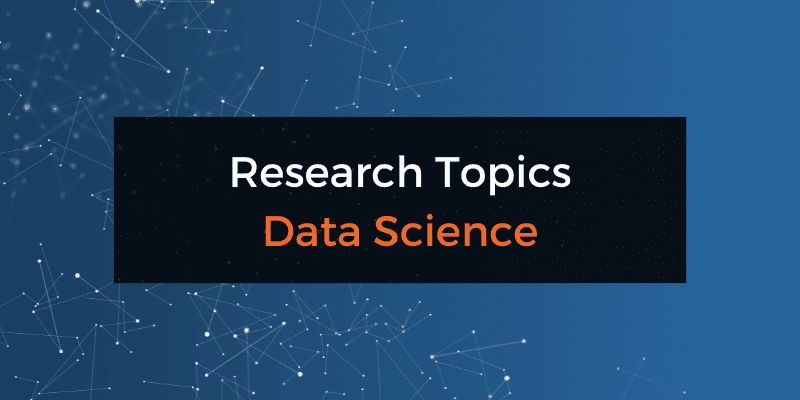
If you’re just starting out exploring data science-related topics for your dissertation, thesis or research project, you’ve come to the right place. In this post, we’ll help kickstart your research by providing a hearty list of data science and analytics-related research ideas , including examples from recent studies.
PS – This is just the start…
We know it’s exciting to run through a list of research topics, but please keep in mind that this list is just a starting point . These topic ideas provided here are intentionally broad and generic , so keep in mind that you will need to develop them further. Nevertheless, they should inspire some ideas for your project.
To develop a suitable research topic, you’ll need to identify a clear and convincing research gap , and a viable plan to fill that gap. If this sounds foreign to you, check out our free research topic webinar that explores how to find and refine a high-quality research topic, from scratch. Alternatively, consider our 1-on-1 coaching service .

Data Science-Related Research Topics
- Developing machine learning models for real-time fraud detection in online transactions.
- The use of big data analytics in predicting and managing urban traffic flow.
- Investigating the effectiveness of data mining techniques in identifying early signs of mental health issues from social media usage.
- The application of predictive analytics in personalizing cancer treatment plans.
- Analyzing consumer behavior through big data to enhance retail marketing strategies.
- The role of data science in optimizing renewable energy generation from wind farms.
- Developing natural language processing algorithms for real-time news aggregation and summarization.
- The application of big data in monitoring and predicting epidemic outbreaks.
- Investigating the use of machine learning in automating credit scoring for microfinance.
- The role of data analytics in improving patient care in telemedicine.
- Developing AI-driven models for predictive maintenance in the manufacturing industry.
- The use of big data analytics in enhancing cybersecurity threat intelligence.
- Investigating the impact of sentiment analysis on brand reputation management.
- The application of data science in optimizing logistics and supply chain operations.
- Developing deep learning techniques for image recognition in medical diagnostics.
- The role of big data in analyzing climate change impacts on agricultural productivity.
- Investigating the use of data analytics in optimizing energy consumption in smart buildings.
- The application of machine learning in detecting plagiarism in academic works.
- Analyzing social media data for trends in political opinion and electoral predictions.
- The role of big data in enhancing sports performance analytics.
- Developing data-driven strategies for effective water resource management.
- The use of big data in improving customer experience in the banking sector.
- Investigating the application of data science in fraud detection in insurance claims.
- The role of predictive analytics in financial market risk assessment.
- Developing AI models for early detection of network vulnerabilities.

Data Science Research Ideas (Continued)
- The application of big data in public transportation systems for route optimization.
- Investigating the impact of big data analytics on e-commerce recommendation systems.
- The use of data mining techniques in understanding consumer preferences in the entertainment industry.
- Developing predictive models for real estate pricing and market trends.
- The role of big data in tracking and managing environmental pollution.
- Investigating the use of data analytics in improving airline operational efficiency.
- The application of machine learning in optimizing pharmaceutical drug discovery.
- Analyzing online customer reviews to inform product development in the tech industry.
- The role of data science in crime prediction and prevention strategies.
- Developing models for analyzing financial time series data for investment strategies.
- The use of big data in assessing the impact of educational policies on student performance.
- Investigating the effectiveness of data visualization techniques in business reporting.
- The application of data analytics in human resource management and talent acquisition.
- Developing algorithms for anomaly detection in network traffic data.
- The role of machine learning in enhancing personalized online learning experiences.
- Investigating the use of big data in urban planning and smart city development.
- The application of predictive analytics in weather forecasting and disaster management.
- Analyzing consumer data to drive innovations in the automotive industry.
- The role of data science in optimizing content delivery networks for streaming services.
- Developing machine learning models for automated text classification in legal documents.
- The use of big data in tracking global supply chain disruptions.
- Investigating the application of data analytics in personalized nutrition and fitness.
- The role of big data in enhancing the accuracy of geological surveying for natural resource exploration.
- Developing predictive models for customer churn in the telecommunications industry.
- The application of data science in optimizing advertisement placement and reach.
Recent Data Science-Related Studies
While the ideas we’ve presented above are a decent starting point for finding a research topic, they are fairly generic and non-specific. So, it helps to look at actual studies in the data science and analytics space to see how this all comes together in practice.
Below, we’ve included a selection of recent studies to help refine your thinking. These are actual studies, so they can provide some useful insight as to what a research topic looks like in practice.
- Data Science in Healthcare: COVID-19 and Beyond (Hulsen, 2022)
- Auto-ML Web-application for Automated Machine Learning Algorithm Training and evaluation (Mukherjee & Rao, 2022)
- Survey on Statistics and ML in Data Science and Effect in Businesses (Reddy et al., 2022)
- Visualization in Data Science VDS @ KDD 2022 (Plant et al., 2022)
- An Essay on How Data Science Can Strengthen Business (Santos, 2023)
- A Deep study of Data science related problems, application and machine learning algorithms utilized in Data science (Ranjani et al., 2022)
- You Teach WHAT in Your Data Science Course?!? (Posner & Kerby-Helm, 2022)
- Statistical Analysis for the Traffic Police Activity: Nashville, Tennessee, USA (Tufail & Gul, 2022)
- Data Management and Visual Information Processing in Financial Organization using Machine Learning (Balamurugan et al., 2022)
- A Proposal of an Interactive Web Application Tool QuickViz: To Automate Exploratory Data Analysis (Pitroda, 2022)
- Applications of Data Science in Respective Engineering Domains (Rasool & Chaudhary, 2022)
- Jupyter Notebooks for Introducing Data Science to Novice Users (Fruchart et al., 2022)
- Towards a Systematic Review of Data Science Programs: Themes, Courses, and Ethics (Nellore & Zimmer, 2022)
- Application of data science and bioinformatics in healthcare technologies (Veeranki & Varshney, 2022)
- TAPS Responsibility Matrix: A tool for responsible data science by design (Urovi et al., 2023)
- Data Detectives: A Data Science Program for Middle Grade Learners (Thompson & Irgens, 2022)
- MACHINE LEARNING FOR NON-MAJORS: A WHITE BOX APPROACH (Mike & Hazzan, 2022)
- COMPONENTS OF DATA SCIENCE AND ITS APPLICATIONS (Paul et al., 2022)
- Analysis on the Application of Data Science in Business Analytics (Wang, 2022)
As you can see, these research topics are a lot more focused than the generic topic ideas we presented earlier. So, for you to develop a high-quality research topic, you’ll need to get specific and laser-focused on a specific context with specific variables of interest. In the video below, we explore some other important things you’ll need to consider when crafting your research topic.
Get 1-On-1 Help
If you’re still unsure about how to find a quality research topic, check out our Research Topic Kickstarter service, which is the perfect starting point for developing a unique, well-justified research topic.

You Might Also Like:

Submit a Comment Cancel reply
Your email address will not be published. Required fields are marked *
Save my name, email, and website in this browser for the next time I comment.
- Print Friendly

37 Research Topics In Data Science To Stay On Top Of
- February 22, 2024
As a data scientist, staying on top of the latest research in your field is essential.
The data science landscape changes rapidly, and new techniques and tools are constantly being developed.
To keep up with the competition, you need to be aware of the latest trends and topics in data science research.
In this article, we will provide an overview of 37 hot research topics in data science.
We will discuss each topic in detail, including its significance and potential applications.
These topics could be an idea for a thesis or simply topics you can research independently.
Stay tuned – this is one blog post you don’t want to miss!
37 Research Topics in Data Science
1.) predictive modeling.
Predictive modeling is a significant portion of data science and a topic you must be aware of.
Simply put, it is the process of using historical data to build models that can predict future outcomes.
Predictive modeling has many applications, from marketing and sales to financial forecasting and risk management.
As businesses increasingly rely on data to make decisions, predictive modeling is becoming more and more important.
While it can be complex, predictive modeling is a powerful tool that gives businesses a competitive advantage.
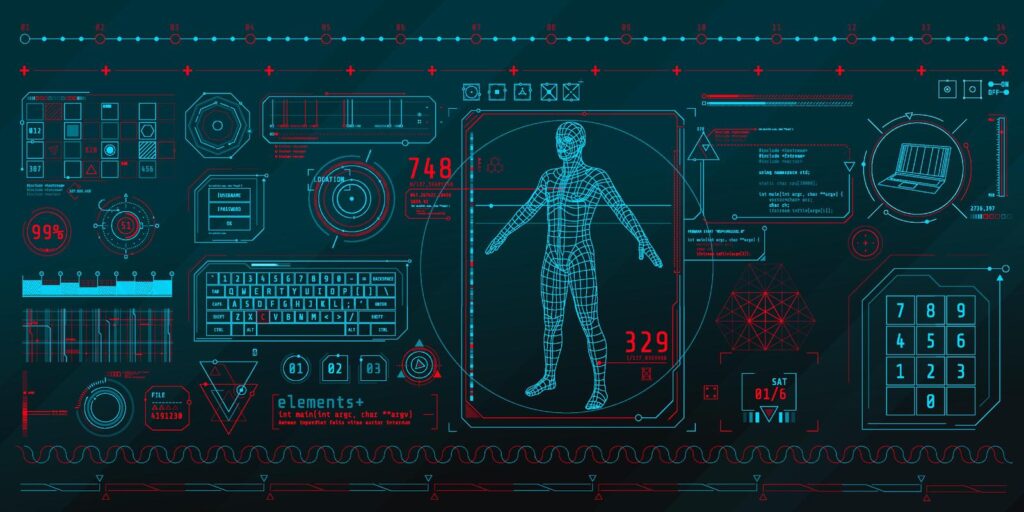
2.) Big Data Analytics
These days, it seems like everyone is talking about big data.
And with good reason – organizations of all sizes are sitting on mountains of data, and they’re increasingly turning to data scientists to help them make sense of it all.
But what exactly is big data? And what does it mean for data science?
Simply put, big data is a term used to describe datasets that are too large and complex for traditional data processing techniques.
Big data typically refers to datasets of a few terabytes or more.
But size isn’t the only defining characteristic – big data is also characterized by its high Velocity (the speed at which data is generated), Variety (the different types of data), and Volume (the amount of the information).
Given the enormity of big data, it’s not surprising that organizations are struggling to make sense of it all.
That’s where data science comes in.
Data scientists use various methods to wrangle big data, including distributed computing and other decentralized technologies.
With the help of data science, organizations are beginning to unlock the hidden value in their big data.
By harnessing the power of big data analytics, they can improve their decision-making, better understand their customers, and develop new products and services.
3.) Auto Machine Learning
Auto machine learning is a research topic in data science concerned with developing algorithms that can automatically learn from data without intervention.
This area of research is vital because it allows data scientists to automate the process of writing code for every dataset.
This allows us to focus on other tasks, such as model selection and validation.
Auto machine learning algorithms can learn from data in a hands-off way for the data scientist – while still providing incredible insights.
This makes them a valuable tool for data scientists who either don’t have the skills to do their own analysis or are struggling.

4.) Text Mining
Text mining is a research topic in data science that deals with text data extraction.
This area of research is important because it allows us to get as much information as possible from the vast amount of text data available today.
Text mining techniques can extract information from text data, such as keywords, sentiments, and relationships.
This information can be used for various purposes, such as model building and predictive analytics.
5.) Natural Language Processing
Natural language processing is a data science research topic that analyzes human language data.
This area of research is important because it allows us to understand and make sense of the vast amount of text data available today.
Natural language processing techniques can build predictive and interactive models from any language data.
Natural Language processing is pretty broad, and recent advances like GPT-3 have pushed this topic to the forefront.
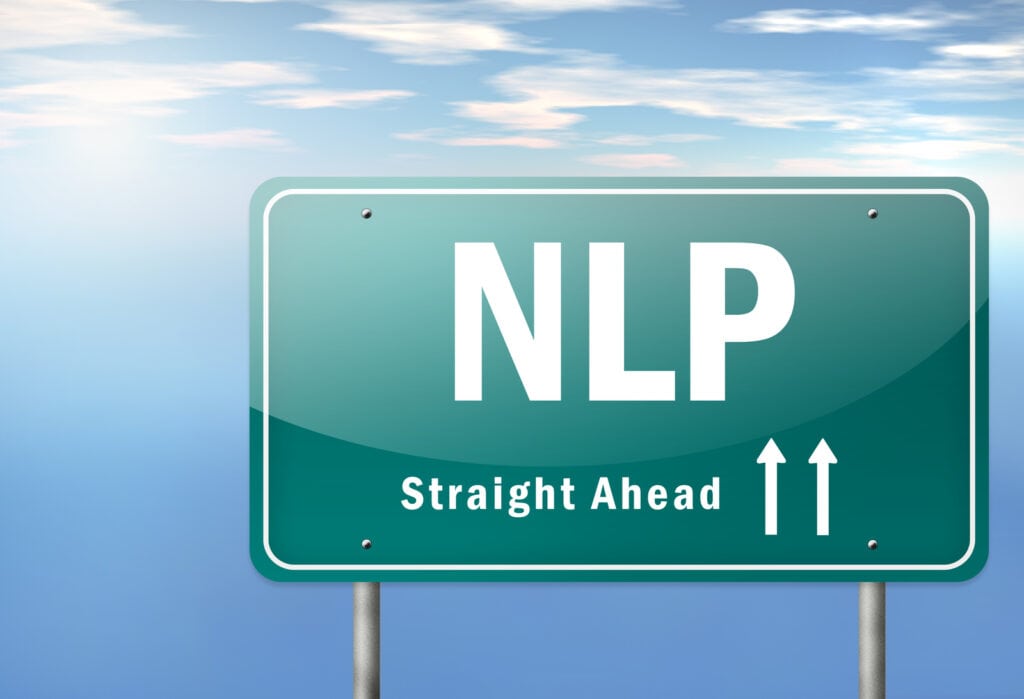
6.) Recommender Systems
Recommender systems are an exciting topic in data science because they allow us to make better products, services, and content recommendations.
Businesses can better understand their customers and their needs by using recommender systems.
This, in turn, allows them to develop better products and services that meet the needs of their customers.
Recommender systems are also used to recommend content to users.
This can be done on an individual level or at a group level.
Think about Netflix, for example, always knowing what you want to watch!
Recommender systems are a valuable tool for businesses and users alike.
7.) Deep Learning
Deep learning is a research topic in data science that deals with artificial neural networks.
These networks are composed of multiple layers, and each layer is formed from various nodes.
Deep learning networks can learn from data similarly to how humans learn, irrespective of the data distribution.
This makes them a valuable tool for data scientists looking to build models that can learn from data independently.
The deep learning network has become very popular in recent years because of its ability to achieve state-of-the-art results on various tasks.
There seems to be a new SOTA deep learning algorithm research paper on https://arxiv.org/ every single day!
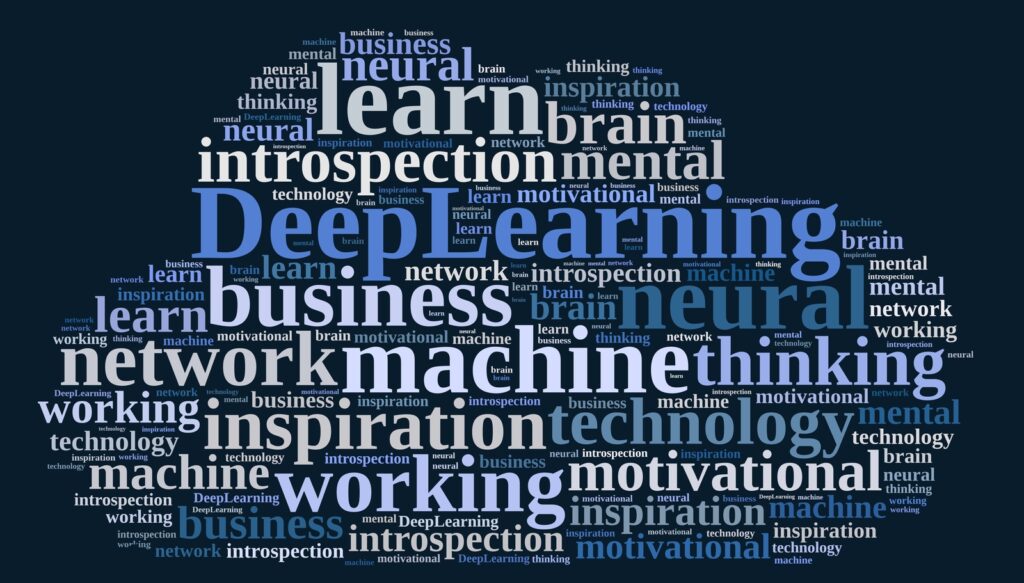
8.) Reinforcement Learning
Reinforcement learning is a research topic in data science that deals with algorithms that can learn on multiple levels from interactions with their environment.
This area of research is essential because it allows us to develop algorithms that can learn non-greedy approaches to decision-making, allowing businesses and companies to win in the long term compared to the short.
9.) Data Visualization
Data visualization is an excellent research topic in data science because it allows us to see our data in a way that is easy to understand.
Data visualization techniques can be used to create charts, graphs, and other visual representations of data.
This allows us to see the patterns and trends hidden in our data.
Data visualization is also used to communicate results to others.
This allows us to share our findings with others in a way that is easy to understand.
There are many ways to contribute to and learn about data visualization.
Some ways include attending conferences, reading papers, and contributing to open-source projects.
10.) Predictive Maintenance
Predictive maintenance is a hot topic in data science because it allows us to prevent failures before they happen.
This is done using data analytics to predict when a failure will occur.
This allows us to take corrective action before the failure actually happens.
While this sounds simple, avoiding false positives while keeping recall is challenging and an area wide open for advancement.
11.) Financial Analysis
Financial analysis is an older topic that has been around for a while but is still a great field where contributions can be felt.
Current researchers are focused on analyzing macroeconomic data to make better financial decisions.
This is done by analyzing the data to identify trends and patterns.
Financial analysts can use this information to make informed decisions about where to invest their money.
Financial analysis is also used to predict future economic trends.
This allows businesses and individuals to prepare for potential financial hardships and enable companies to be cash-heavy during good economic conditions.
Overall, financial analysis is a valuable tool for anyone looking to make better financial decisions.

12.) Image Recognition
Image recognition is one of the hottest topics in data science because it allows us to identify objects in images.
This is done using artificial intelligence algorithms that can learn from data and understand what objects you’re looking for.
This allows us to build models that can accurately recognize objects in images and video.
This is a valuable tool for businesses and individuals who want to be able to identify objects in images.
Think about security, identification, routing, traffic, etc.
Image Recognition has gained a ton of momentum recently – for a good reason.
13.) Fraud Detection
Fraud detection is a great topic in data science because it allows us to identify fraudulent activity before it happens.
This is done by analyzing data to look for patterns and trends that may be associated with the fraud.
Once our machine learning model recognizes some of these patterns in real time, it immediately detects fraud.
This allows us to take corrective action before the fraud actually happens.
Fraud detection is a valuable tool for anyone who wants to protect themselves from potential fraudulent activity.
14.) Web Scraping
Web scraping is a controversial topic in data science because it allows us to collect data from the web, which is usually data you do not own.
This is done by extracting data from websites using scraping tools that are usually custom-programmed.
This allows us to collect data that would otherwise be inaccessible.
For obvious reasons, web scraping is a unique tool – giving you data your competitors would have no chance of getting.
I think there is an excellent opportunity to create new and innovative ways to make scraping accessible for everyone, not just those who understand Selenium and Beautiful Soup.
15.) Social Media Analysis
Social media analysis is not new; many people have already created exciting and innovative algorithms to study this.
However, it is still a great data science research topic because it allows us to understand how people interact on social media.
This is done by analyzing data from social media platforms to look for insights, bots, and recent societal trends.
Once we understand these practices, we can use this information to improve our marketing efforts.
For example, if we know that a particular demographic prefers a specific type of content, we can create more content that appeals to them.
Social media analysis is also used to understand how people interact with brands on social media.
This allows businesses to understand better what their customers want and need.
Overall, social media analysis is valuable for anyone who wants to improve their marketing efforts or understand how customers interact with brands.

16.) GPU Computing
GPU computing is a fun new research topic in data science because it allows us to process data much faster than traditional CPUs .
Due to how GPUs are made, they’re incredibly proficient at intense matrix operations, outperforming traditional CPUs by very high margins.
While the computation is fast, the coding is still tricky.
There is an excellent research opportunity to bring these innovations to non-traditional modules, allowing data science to take advantage of GPU computing outside of deep learning.
17.) Quantum Computing
Quantum computing is a new research topic in data science and physics because it allows us to process data much faster than traditional computers.
It also opens the door to new types of data.
There are just some problems that can’t be solved utilizing outside of the classical computer.
For example, if you wanted to understand how a single atom moved around, a classical computer couldn’t handle this problem.
You’ll need to utilize a quantum computer to handle quantum mechanics problems.
This may be the “hottest” research topic on the planet right now, with some of the top researchers in computer science and physics worldwide working on it.
You could be too.
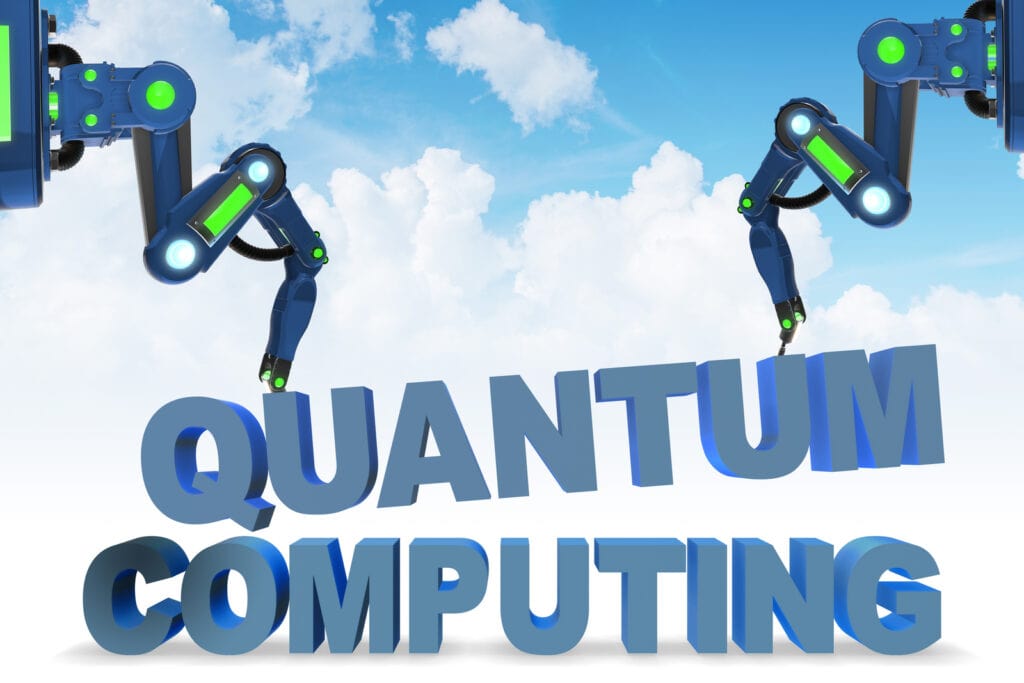
18.) Genomics
Genomics may be the only research topic that can compete with quantum computing regarding the “number of top researchers working on it.”
Genomics is a fantastic intersection of data science because it allows us to understand how genes work.
This is done by sequencing the DNA of different organisms to look for insights into our and other species.
Once we understand these patterns, we can use this information to improve our understanding of diseases and create new and innovative treatments for them.
Genomics is also used to study the evolution of different species.
Genomics is the future and a field begging for new and exciting research professionals to take it to the next step.
19.) Location-based services
Location-based services are an old and time-tested research topic in data science.
Since GPS and 4g cell phone reception became a thing, we’ve been trying to stay informed about how humans interact with their environment.
This is done by analyzing data from GPS tracking devices, cell phone towers, and Wi-Fi routers to look for insights into how humans interact.
Once we understand these practices, we can use this information to improve our geotargeting efforts, improve maps, find faster routes, and improve cohesion throughout a community.
Location-based services are used to understand the user, something every business could always use a little bit more of.
While a seemingly “stale” field, location-based services have seen a revival period with self-driving cars.

20.) Smart City Applications
Smart city applications are all the rage in data science research right now.
By harnessing the power of data, cities can become more efficient and sustainable.
But what exactly are smart city applications?
In short, they are systems that use data to improve city infrastructure and services.
This can include anything from traffic management and energy use to waste management and public safety.
Data is collected from various sources, including sensors, cameras, and social media.
It is then analyzed to identify tendencies and habits.
This information can make predictions about future needs and optimize city resources.
As more and more cities strive to become “smart,” the demand for data scientists with expertise in smart city applications is only growing.
21.) Internet Of Things (IoT)
The Internet of Things, or IoT, is exciting and new data science and sustainability research topic.
IoT is a network of physical objects embedded with sensors and connected to the internet.
These objects can include everything from alarm clocks to refrigerators; they’re all connected to the internet.
That means that they can share data with computers.
And that’s where data science comes in.
Data scientists are using IoT data to learn everything from how people use energy to how traffic flows through a city.
They’re also using IoT data to predict when an appliance will break down or when a road will be congested.
Really, the possibilities are endless.
With such a wide-open field, it’s easy to see why IoT is being researched by some of the top professionals in the world.

22.) Cybersecurity
Cybersecurity is a relatively new research topic in data science and in general, but it’s already garnering a lot of attention from businesses and organizations.
After all, with the increasing number of cyber attacks in recent years, it’s clear that we need to find better ways to protect our data.
While most of cybersecurity focuses on infrastructure, data scientists can leverage historical events to find potential exploits to protect their companies.
Sometimes, looking at a problem from a different angle helps, and that’s what data science brings to cybersecurity.
Also, data science can help to develop new security technologies and protocols.
As a result, cybersecurity is a crucial data science research area and one that will only become more important in the years to come.
23.) Blockchain
Blockchain is an incredible new research topic in data science for several reasons.
First, it is a distributed database technology that enables secure, transparent, and tamper-proof transactions.
Did someone say transmitting data?
This makes it an ideal platform for tracking data and transactions in various industries.
Second, blockchain is powered by cryptography, which not only makes it highly secure – but is a familiar foe for data scientists.
Finally, blockchain is still in its early stages of development, so there is much room for research and innovation.
As a result, blockchain is a great new research topic in data science that vows to revolutionize how we store, transmit and manage data.

24.) Sustainability
Sustainability is a relatively new research topic in data science, but it is gaining traction quickly.
To keep up with this demand, The Wharton School of the University of Pennsylvania has started to offer an MBA in Sustainability .
This demand isn’t shocking, and some of the reasons include the following:
Sustainability is an important issue that is relevant to everyone.
Datasets on sustainability are constantly growing and changing, making it an exciting challenge for data scientists.
There hasn’t been a “set way” to approach sustainability from a data perspective, making it an excellent opportunity for interdisciplinary research.
As data science grows, sustainability will likely become an increasingly important research topic.
25.) Educational Data
Education has always been a great topic for research, and with the advent of big data, educational data has become an even richer source of information.
By studying educational data, researchers can gain insights into how students learn, what motivates them, and what barriers these students may face.
Besides, data science can be used to develop educational interventions tailored to individual students’ needs.
Imagine being the researcher that helps that high schooler pass mathematics; what an incredible feeling.
With the increasing availability of educational data, data science has enormous potential to improve the quality of education.

26.) Politics
As data science continues to evolve, so does the scope of its applications.
Originally used primarily for business intelligence and marketing, data science is now applied to various fields, including politics.
By analyzing large data sets, political scientists (data scientists with a cooler name) can gain valuable insights into voting patterns, campaign strategies, and more.
Further, data science can be used to forecast election results and understand the effects of political events on public opinion.
With the wealth of data available, there is no shortage of research opportunities in this field.
As data science evolves, so does our understanding of politics and its role in our world.
27.) Cloud Technologies
Cloud technologies are a great research topic.
It allows for the outsourcing and sharing of computer resources and applications all over the internet.
This lets organizations save money on hardware and maintenance costs while providing employees access to the latest and greatest software and applications.
I believe there is an argument that AWS could be the greatest and most technologically advanced business ever built (Yes, I know it’s only part of the company).
Besides, cloud technologies can help improve team members’ collaboration by allowing them to share files and work on projects together in real-time.
As more businesses adopt cloud technologies, data scientists must stay up-to-date on the latest trends in this area.
By researching cloud technologies, data scientists can help organizations to make the most of this new and exciting technology.

28.) Robotics
Robotics has recently become a household name, and it’s for a good reason.
First, robotics deals with controlling and planning physical systems, an inherently complex problem.
Second, robotics requires various sensors and actuators to interact with the world, making it an ideal application for machine learning techniques.
Finally, robotics is an interdisciplinary field that draws on various disciplines, such as computer science, mechanical engineering, and electrical engineering.
As a result, robotics is a rich source of research problems for data scientists.
29.) HealthCare
Healthcare is an industry that is ripe for data-driven innovation.
Hospitals, clinics, and health insurance companies generate a tremendous amount of data daily.
This data can be used to improve the quality of care and outcomes for patients.
This is perfect timing, as the healthcare industry is undergoing a significant shift towards value-based care, which means there is a greater need than ever for data-driven decision-making.
As a result, healthcare is an exciting new research topic for data scientists.
There are many different ways in which data can be used to improve healthcare, and there is a ton of room for newcomers to make discoveries.

30.) Remote Work
There’s no doubt that remote work is on the rise.
In today’s global economy, more and more businesses are allowing their employees to work from home or anywhere else they can get a stable internet connection.
But what does this mean for data science? Well, for one thing, it opens up a whole new field of research.
For example, how does remote work impact employee productivity?
What are the best ways to manage and collaborate on data science projects when team members are spread across the globe?
And what are the cybersecurity risks associated with working remotely?
These are just a few of the questions that data scientists will be able to answer with further research.
So if you’re looking for a new topic to sink your teeth into, remote work in data science is a great option.
31.) Data-Driven Journalism
Data-driven journalism is an exciting new field of research that combines the best of both worlds: the rigor of data science with the creativity of journalism.
By applying data analytics to large datasets, journalists can uncover stories that would otherwise be hidden.
And telling these stories compellingly can help people better understand the world around them.
Data-driven journalism is still in its infancy, but it has already had a major impact on how news is reported.
In the future, it will only become more important as data becomes increasingly fluid among journalists.
It is an exciting new topic and research field for data scientists to explore.

32.) Data Engineering
Data engineering is a staple in data science, focusing on efficiently managing data.
Data engineers are responsible for developing and maintaining the systems that collect, process, and store data.
In recent years, there has been an increasing demand for data engineers as the volume of data generated by businesses and organizations has grown exponentially.
Data engineers must be able to design and implement efficient data-processing pipelines and have the skills to optimize and troubleshoot existing systems.
If you are looking for a challenging research topic that would immediately impact you worldwide, then improving or innovating a new approach in data engineering would be a good start.
33.) Data Curation
Data curation has been a hot topic in the data science community for some time now.
Curating data involves organizing, managing, and preserving data so researchers can use it.
Data curation can help to ensure that data is accurate, reliable, and accessible.
It can also help to prevent research duplication and to facilitate the sharing of data between researchers.
Data curation is a vital part of data science. In recent years, there has been an increasing focus on data curation, as it has become clear that it is essential for ensuring data quality.
As a result, data curation is now a major research topic in data science.
There are numerous books and articles on the subject, and many universities offer courses on data curation.
Data curation is an integral part of data science and will only become more important in the future.

34.) Meta-Learning
Meta-learning is gaining a ton of steam in data science. It’s learning how to learn.
So, if you can learn how to learn, you can learn anything much faster.
Meta-learning is mainly used in deep learning, as applications outside of this are generally pretty hard.
In deep learning, many parameters need to be tuned for a good model, and there’s usually a lot of data.
You can save time and effort if you can automatically and quickly do this tuning.
In machine learning, meta-learning can improve models’ performance by sharing knowledge between different models.
For example, if you have a bunch of different models that all solve the same problem, then you can use meta-learning to share the knowledge between them to improve the cluster (groups) overall performance.
I don’t know how anyone looking for a research topic could stay away from this field; it’s what the Terminator warned us about!
35.) Data Warehousing
A data warehouse is a system used for data analysis and reporting.
It is a central data repository created by combining data from multiple sources.
Data warehouses are often used to store historical data, such as sales data, financial data, and customer data.
This data type can be used to create reports and perform statistical analysis.
Data warehouses also store data that the organization is not currently using.
This type of data can be used for future research projects.
Data warehousing is an incredible research topic in data science because it offers a variety of benefits.
Data warehouses help organizations to save time and money by reducing the need for manual data entry.
They also help to improve the accuracy of reports and provide a complete picture of the organization’s performance.
Data warehousing feels like one of the weakest parts of the Data Science Technology Stack; if you want a research topic that could have a monumental impact – data warehousing is an excellent place to look.
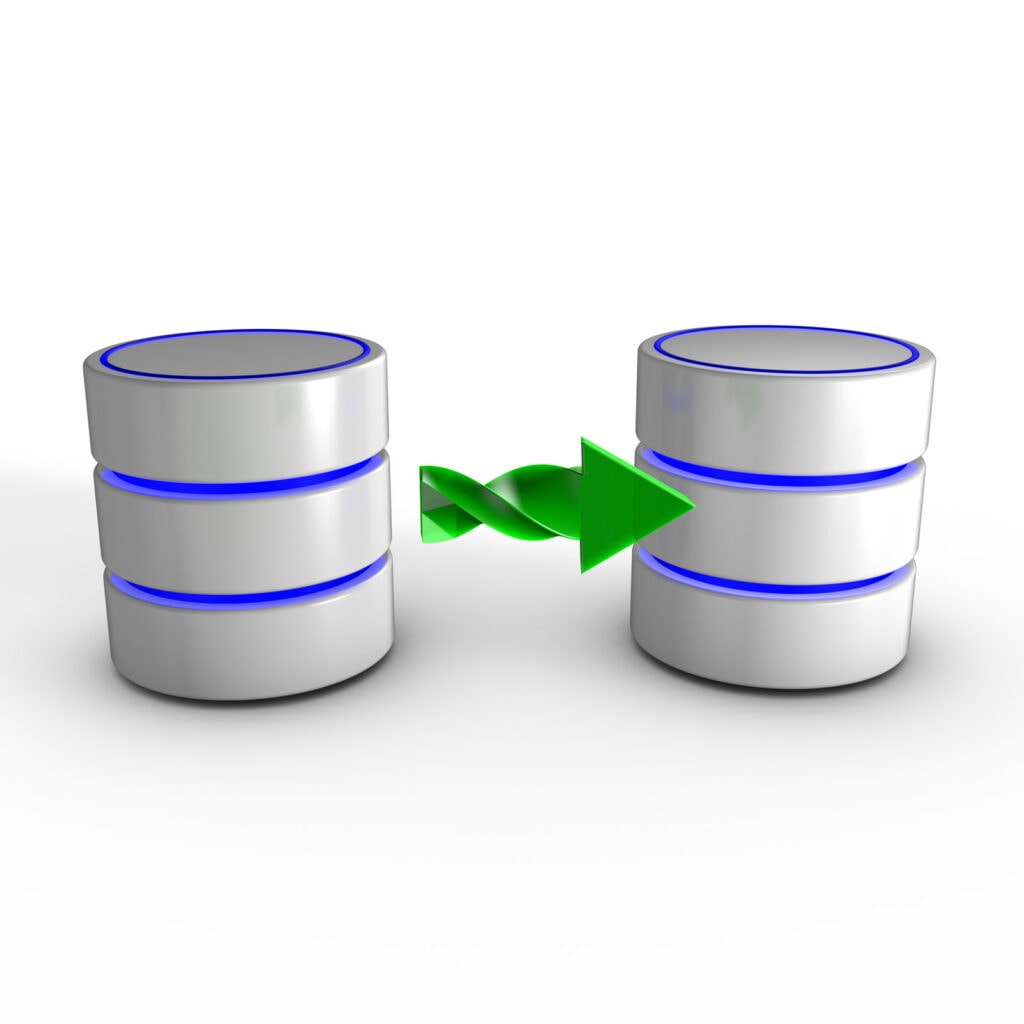
36.) Business Intelligence
Business intelligence aims to collect, process, and analyze data to help businesses make better decisions.
Business intelligence can improve marketing, sales, customer service, and operations.
It can also be used to identify new business opportunities and track competition.
BI is business and another tool in your company’s toolbox to continue dominating your area.
Data science is the perfect tool for business intelligence because it combines statistics, computer science, and machine learning.
Data scientists can use business intelligence to answer questions like, “What are our customers buying?” or “What are our competitors doing?” or “How can we increase sales?”
Business intelligence is a great way to improve your business’s bottom line and an excellent opportunity to dive deep into a well-respected research topic.
37.) Crowdsourcing
One of the newest areas of research in data science is crowdsourcing.
Crowdsourcing is a process of sourcing tasks or projects to a large group of people, typically via the internet.
This can be done for various purposes, such as gathering data, developing new algorithms, or even just for fun (think: online quizzes and surveys).
But what makes crowdsourcing so powerful is that it allows businesses and organizations to tap into a vast pool of talent and resources they wouldn’t otherwise have access to.
And with the rise of social media, it’s easier than ever to connect with potential crowdsource workers worldwide.
Imagine if you could effect that, finding innovative ways to improve how people work together.
That would have a huge effect.

Final Thoughts, Are These Research Topics In Data Science For You?
Thirty-seven different research topics in data science are a lot to take in, but we hope you found a research topic that interests you.
If not, don’t worry – there are plenty of other great topics to explore.
The important thing is to get started with your research and find ways to apply what you learn to real-world problems.
We wish you the best of luck as you begin your data science journey!
Other Data Science Articles
We love talking about data science; here are a couple of our favorite articles:
- Why Are You Interested In Data Science?
- Recent Posts
- App Engine vs Azure: A Comprehensive Comparison [Must-Read] - June 5, 2024
- Do Software Engineers Work 8 Hours a Day? Tips to Boost Productivity [You Won’t Believe 4!] - June 4, 2024
- Mastering How to Measure Dispersion [Optimize Your Data Analysis] - June 4, 2024

Data Science Dissertation Topics
February 20, 2024
Dr Jana Martiskova
Click here to place an order for topic brief service to get instant approval from your professor.
Table of Contents
Unlocking the Realm of Data Science Dissertation Topics
In the ever-evolving landscape of technology, data science stands as a cornerstone, reshaping industries and revolutionizing approaches to problem-solving. As the demand for data-driven insights continues to soar, the pursuit of knowledge in this field becomes increasingly crucial.
For those embarking on the journey of academic exploration within data science, choosing the right dissertation topic is paramount. With an array of possibilities awaiting exploration, the task can be both exhilarating and daunting.
To aid in this endeavor, we present a comprehensive guide encompassing categories of Data Science Dissertation Topics, each offering a fertile ground for research and innovation.
Introduction
Data science, an interdisciplinary field that extracts insights and knowledge from data, has witnessed unprecedented growth in recent years. From healthcare to finance, education to marketing, the applications of data science are vast and diverse.
At the heart of this discipline lies the dissertation—a culmination of rigorous research, critical analysis, and innovative thinking. Choosing the right topic is not merely a matter of academic requirement but a strategic decision that can shape one’s career trajectory. With this in mind, let us delve into the myriad possibilities offered by Data Science Dissertation Topics.
Categories of Data Science Dissertation Topics
Machine learning and artificial intelligence.
- Enhancing Fraud Detection Systems using Deep Learning Algorithms
- Personalized Recommendation Systems: A Comparative Analysis of Machine Learning Approaches
- Predictive Modeling for Disease Diagnosis and Treatment
Big Data Analytics
- Optimizing Supply Chain Management through Big Data Analytics
- Sentiment Analysis on Social Media Data: Understanding Customer Perception
- Big Data-driven Strategies for Urban Planning and Development
Natural Language Processing (NLP)
- Automated Text Summarization Techniques: A Comparative Study
- Language Translation Models: Challenges and Opportunities
- Sentiment Analysis in Political Discourse: Uncovering Public Opinion
Data Mining and Knowledge Discovery
- Association Rule Mining for Market Basket Analysis
- Clustering Techniques for Customer Segmentation in E-commerce
- Predictive Analytics in Stock Market Forecasting
Health Informatics
- Predictive Modeling for Early Disease Detection
- Wearable Devices and Remote Patient Monitoring: A Data-driven Approach
- Data Privacy and Security in Healthcare Data Sharing Platforms
Business Intelligence and Analytics
- Data-driven Decision Making in Marketing Campaigns
- Customer Lifetime Value Prediction: A Machine Learning Approach
- Performance Analytics for Business Process Optimization
IoT and Sensor Data Analytics
- Smart Cities: Leveraging IoT Data for Urban Sustainability
- Predictive Maintenance in Industrial IoT: Anomaly Detection Techniques
- Environmental Monitoring using Sensor Networks: Challenges and Opportunities
Image and Video Analysis
- Object Detection and Recognition in Surveillance Videos
- Medical Image Analysis: Applications in Diagnosis and Treatment
- Deep Learning Approaches for Facial Recognition Systems
Social Network Analysis
- Influence Detection in Social Networks: A Graph-based Approach.
- Community Detection and Analysis in Online Social Platforms
- Fake News Detection using Social Network Analysis Techniques
Time Series Analysis
- Forecasting Demand in Retail: Time Series Models for Sales Prediction
- Financial Market Volatility Prediction using Time Series Analysis
- Energy Consumption Forecasting: A Comparative Study of Forecasting Models
Spatial Data Analysis
- Geographic Information Systems (GIS) for Urban Planning
- Spatial-Temporal Analysis of Crime Patterns: A Case Study
- Environmental Impact Assessment using Spatial Data Analysis Techniques
Bioinformatics
- Genomic Data Analysis: Towards Precision Medicine
- Protein Structure Prediction using Machine Learning Algorithms
- Computational Drug Discovery: Opportunities and Challenges
Data Privacy and Ethics
- Privacy-preserving Data Mining Techniques: Balancing Utility and Privacy
- Ethical Considerations in AI-driven Decision Making Systems
- GDPR Compliance in Data-driven Businesses: Challenges and Solutions
Deep Learning Applications
- Deep Reinforcement Learning for Autonomous Vehicles
- Generative Adversarial Networks (GANs) for Synthetic Data Generation
- Deep Learning Models for Natural Language Understanding
Blockchain and Data Science
- Blockchain-enabled Data Sharing Platforms: Opportunities and Challenges
- Decentralized Data Marketplaces: A Paradigm Shift in Data Economy
- Security and Privacy in Blockchain-based Data Analytics
- Computer Science Research Topics (Approved Titles)
- Which topics are best for thesis in Computer Science?
- Information Systems Dissertation Topics Ideas
In the realm of Data Science Dissertation Topics, the possibilities are as vast as the datasets themselves. Each category offers a unique lens through which one can explore and contribute to the advancement of knowledge in this dynamic field.
Whether delving into the intricacies of machine learning algorithms or unraveling the complexities of social networks, the journey promises both challenges and rewards.
As aspiring researchers embark on this voyage of discovery, the importance of selecting a topic that aligns with one’s interests, expertise, and aspirations cannot be overstated. With the right guidance and resources, every dissertation holds the potential to make a significant impact in the realm of data science.
Data Science Dissertation Topics Brief Service
Are you struggling to find the perfect Data Science Dissertation Topic tailored to your interests and expertise? Our customized topics brief service is designed to provide personalized guidance and support in selecting a dissertation topic that aligns with your academic goals. Fill the form below to get started on your journey towards academic excellence in data science.
Paid Topic Mini Proposal (500 Words)
Undergraduate.
You will get the topics first and then the mini proposal which includes:
- An explanation why we choose this topic.
- 2-3 research questions.
- Key literature resources identification.
- Suitable methodology including raw sample size and data collection method
- View a Sample of Service
Note: After submitting your order please must check your email [inbox/spam] folders for order confirmation and login details. If the email goes in spam please mark not as spam to avoid any communication gap between us.
Get An Expert Dissertation Writing Help To Achieve Good Grades
By placing an order with us, you can get;
- Writer consultation before payment to ensure your work is in safe hands.
- Free topic if you don't have one
- Draft submissions to check the quality of the work as per supervisor's feedback
- Free revisions
- Complete privacy
- Plagiarism Free work
- Guaranteed 2:1 (With help of your supervisor's feedback)
- 2 Instalments plan
- Special discounts
Leave a Comment Cancel reply
Save my name, email, and website in this browser for the next time I comment.
WhatsApp and Get 35% off promo code now!
99+ Interesting Data Science Research Topics For Students In 2024
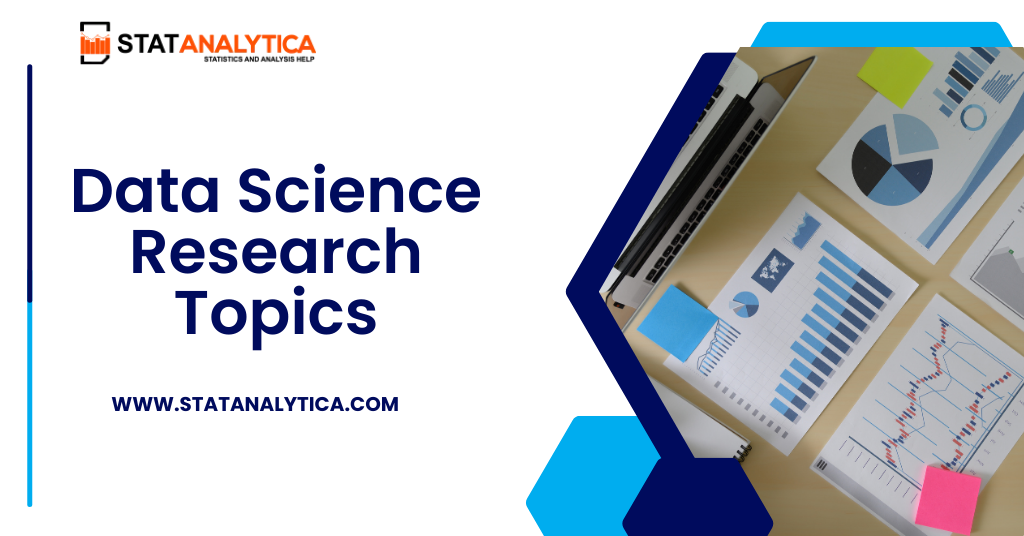
In today’s information-driven world, data science research stands as a pivotal domain shaping our understanding and application of vast data sets. It amalgamates statistics, computer science, and domain knowledge to extract valuable insights from data. Understanding ‘What Is Data Science?’ is fundamental—a field exploring patterns, trends, and solutions embedded within data.
However, the significance of data science research papers in a student’s life cannot be overstated. They foster critical thinking, analytical skills, and a deeper comprehension of the subject matter. To aid students in navigating this realm effectively, this blog dives into essential elements integral to a data science research paper, while also offering a goldmine of 99+ engaging and timely data science research topics for 2024.
Unraveling tips for crafting an impactful research paper and insights on choosing the right topic, this blog is a compass for students exploring data science research topics. Stay tuned to unearth more about ‘data science research topics’ and refine your academic journey.
What Is Data Science?
Table of Contents
Data Science is like a detective for information! It’s all about uncovering secrets and finding valuable stuff in heaps of data. Imagine you have a giant puzzle with tons of pieces scattered around. Data Science helps in sorting these pieces and figuring out the picture they create. It uses tools and skills from math, computer science, and knowledge about different fields to solve real-world problems.
In simpler terms, Data Science is like a chef in a kitchen, blending ingredients to create a perfect dish. Instead of food, it combines data—numbers, words, pictures—to cook up solutions. It helps in understanding patterns, making predictions, and answering tricky questions by exploring data from various sources. In essence, Data Science is the magic that turns data chaos into meaningful insights that can guide decisions and make life better.
Importance Of Data Science Research Paper In Student’s Life
Data Science research papers are like treasure maps for students! They’re super important because they teach students how to explore and understand the world of data. Writing these papers helps students develop problem-solving skills, think critically, and become better at analyzing information. It’s like a fun adventure where they learn how to dig into data and uncover valuable insights that can solve real-world problems.
- Enhances critical thinking: Research papers challenge students to analyze and interpret data critically, honing their thinking skills.
- Fosters analytical abilities: Students learn to sift through vast amounts of data, extracting meaningful patterns and information.
- Encourages exploration: Engaging in research encourages students to explore diverse data sources, broadening their knowledge horizon.
- Develops communication skills: Writing research papers hones students’ ability to articulate complex findings and ideas clearly.
- Prepares for real-world challenges: Through research, students learn to apply theoretical knowledge to practical problems, preparing them for future endeavors.
Elements That Must Be Present In Data Science Research Paper
Here are some elements that must be present in data science research paper:
1. Clear Objective
A data science research paper should start with a clear goal, stating what the study aims to investigate or achieve. This objective guides the entire paper, helping readers understand the purpose and direction of the research.
2. Detailed Methodology
Explaining how the research was conducted is crucial. The paper should outline the tools, techniques, and steps used to collect, analyze, and interpret data. This section allows others to replicate the study and validate its findings.
3. Accurate Data Presentation
Presenting data in an organized and understandable manner is key. Graphs, charts, and tables should be used to illustrate findings clearly, aiding readers’ comprehension of the results.
4. Thorough Analysis and Interpretation
Simply presenting data isn’t enough; the paper should delve into a deep analysis, explaining the meaning behind the numbers. Interpretation helps draw conclusions and insights from the data.
5. Conclusive Findings and Recommendations
A strong conclusion summarizes the key findings of the research. It should also offer suggestions or recommendations based on the study’s outcomes, indicating potential avenues for future exploration.
Here are some interesting data science research topics for students in 2024:
Natural Language Processing (NLP)
- Multi-modal Contextual Understanding: Integrating text, images, and audio to enhance NLP models’ comprehension abilities.
- Cross-lingual Transfer Learning: Investigating methods to transfer knowledge from one language to another for improved translation and understanding.
- Emotion Detection in Text: Developing models to accurately detect and interpret emotions conveyed in textual content.
- Sarcasm Detection in Social Media: Building algorithms that can identify and understand sarcastic remarks in online conversations.
- Language Generation for Code: Generating code snippets and scripts from natural language descriptions using NLP techniques.
- Bias Mitigation in Language Models: Developing strategies to mitigate biases present in large language models and ensure fairness in generated content.
- Dialogue Systems for Personalized Assistance: Creating intelligent conversational agents that provide personalized assistance based on user preferences and history.
- Summarization of Legal Documents: Developing NLP models capable of summarizing lengthy legal documents for quick understanding and analysis.
- Understanding Contextual Nuances in Sentiment Analysis: Enhancing sentiment analysis models to better comprehend contextual nuances and sarcasm in text.
- Hate Speech Detection and Moderation: Building systems to detect and moderate hate speech and offensive language in online content.
Computer Vision
- Weakly Supervised Object Detection: Exploring methods to train object detection models with limited annotated data.
- Video Action Recognition in Uncontrolled Environments: Developing models that can recognize human actions in videos captured in uncontrolled settings.
- Image Generation and Translation: Investigating techniques to generate realistic images from textual descriptions and translate images across different domains.
- Scene Understanding in Autonomous Systems: Enhancing computer vision algorithms for better scene understanding in autonomous vehicles and robotics.
- Fine-grained Visual Classification: Improving models to classify objects at a more granular level, distinguishing subtle differences within similar categories.
- Visual Question Answering (VQA): Creating systems capable of answering questions based on visual input, requiring reasoning and comprehension abilities.
- Medical Image Analysis for Disease Diagnosis: Developing computer vision models for accurate and early diagnosis of diseases from medical images.
- Action Localization in Videos: Building models to precisely localize and recognize specific actions within video sequences.
- Image Captioning with Contextual Understanding: Generating captions for images considering the context and relationships between objects.
- Human Pose Estimation in Real-time: Improving algorithms for real-time estimation of human poses in videos for applications like motion analysis and gaming.
Machine Learning Algorithms
- Self-supervised Learning Techniques: Exploring novel methods for training machine learning models without explicit supervision.
- Continual Learning in Dynamic Environments: Investigating algorithms that can continuously learn and adapt to changing data distributions and tasks.
- Explainable AI for Model Interpretability: Developing techniques to explain the decisions and predictions made by complex machine learning models.
- Transfer Learning for Small Datasets: Techniques to effectively transfer knowledge from large datasets to small or domain-specific datasets.
- Adaptive Learning Rate Optimization: Enhancing optimization algorithms to dynamically adjust learning rates based on data characteristics.
- Robustness to Adversarial Attacks: Building models resistant to adversarial attacks, ensuring stability and security in machine learning applications.
- Active Learning Strategies: Investigating methods to select and label the most informative data points for model training to minimize labeling efforts.
- Privacy-preserving Machine Learning: Developing algorithms that can train models on sensitive data while preserving individual privacy.
- Fairness-aware Machine Learning: Techniques to ensure fairness and mitigate biases in machine learning models across different demographics.
- Multi-task Learning for Jointly Learning Tasks: Exploring approaches to jointly train models on multiple related tasks to improve overall performance.
Deep Learning
- Graph Neural Networks for Representation Learning: Using deep learning techniques to learn representations from graph-structured data.
- Transformer Models for Image Processing: Adapting transformer architectures for image-related tasks, such as image classification and generation.
- Few-shot Learning Strategies: Investigating methods to enable deep learning models to learn from a few examples in new categories.
- Memory-Augmented Neural Networks: Enhancing neural networks with external memory for improved learning and reasoning capabilities.
- Neural Architecture Search (NAS): Automating the design of neural network architectures for specific tasks or constraints.
- Meta-learning for Fast Adaptation: Developing models capable of quickly adapting to new tasks or domains with minimal data.
- Deep Reinforcement Learning for Robotics: Utilizing deep RL techniques for training robots to perform complex tasks in real-world environments.
- Generative Adversarial Networks (GANs) for Data Augmentation: Using GANs to generate synthetic data for enhancing training datasets.
- Variational Autoencoders for Unsupervised Learning: Exploring VAEs for learning latent representations of data without explicit supervision.
- Lifelong Learning in Deep Networks: Strategies to enable deep networks to continually learn from new data while retaining past knowledge.
Big Data Analytics
- Streaming Data Analysis for Real-time Insights: Techniques to analyze and derive insights from continuous streams of data in real-time.
- Scalable Algorithms for Massive Graphs: Developing algorithms that can efficiently process and analyze large-scale graph-structured data.
- Anomaly Detection in High-dimensional Data: Detecting anomalies and outliers in high-dimensional datasets using advanced statistical methods and machine learning.
- Personalization and Recommendation Systems: Enhancing recommendation algorithms for providing personalized and relevant suggestions to users.
- Data Quality Assessment and Improvement: Methods to assess, clean, and enhance the quality of big data to improve analysis and decision-making.
- Time-to-Event Prediction in Time-series Data: Predicting future events or occurrences based on historical time-series data.
- Geospatial Data Analysis and Visualization: Analyzing and visualizing large-scale geospatial data for various applications such as urban planning, disaster management, etc.
- Privacy-preserving Big Data Analytics: Ensuring data privacy while performing analytics on large-scale datasets in distributed environments.
- Graph-based Deep Learning for Network Analysis: Leveraging deep learning techniques for network analysis and community detection in large-scale networks.
- Dynamic Data Compression Techniques: Developing methods to compress and store large volumes of data efficiently without losing critical information.
Healthcare Analytics
- Predictive Modeling for Patient Outcomes: Using machine learning to predict patient outcomes and personalize treatments based on individual health data.
- Clinical Natural Language Processing for Electronic Health Records (EHR): Extracting valuable information from unstructured EHR data to improve healthcare delivery.
- Wearable Devices and Health Monitoring: Analyzing data from wearable devices to monitor and predict health conditions in real-time.
- Drug Discovery and Development using AI: Utilizing machine learning and AI for efficient drug discovery and development processes.
- Predictive Maintenance in Healthcare Equipment: Developing models to predict and prevent equipment failures in healthcare settings.
- Disease Clustering and Stratification: Grouping diseases based on similarities in symptoms, genetic markers, and response to treatments.
- Telemedicine Analytics: Analyzing data from telemedicine platforms to improve remote healthcare delivery and patient outcomes.
- AI-driven Radiomics for Medical Imaging: Using AI to extract quantitative features from medical images for improved diagnosis and treatment planning.
- Healthcare Resource Optimization: Optimizing resource allocation in healthcare facilities using predictive analytics and operational research techniques.
- Patient Journey Analysis and Personalized Care Pathways: Analyzing patient trajectories to create personalized care pathways and improve healthcare outcomes.
Time Series Analysis
- Forecasting Volatility in Financial Markets: Predicting and modeling volatility in stock prices and financial markets using time series analysis.
- Dynamic Time Warping for Similarity Analysis: Utilizing DTW to measure similarities between time series data, especially in scenarios with temporal distortions.
- Seasonal Pattern Detection and Analysis: Identifying and modeling seasonal patterns in time series data for better forecasting.
- Time Series Anomaly Detection in Industrial IoT: Detecting anomalies in industrial sensor data streams to prevent equipment failures and improve maintenance.
- Multivariate Time Series Forecasting: Developing models to forecast multiple related time series simultaneously, considering interdependencies.
- Non-linear Time Series Analysis Techniques: Exploring non-linear models and methods for analyzing complex time series data.
- Time Series Data Compression for Efficient Storage: Techniques to compress and store time series data efficiently without losing crucial information.
- Event Detection and Classification in Time Series: Identifying and categorizing specific events or patterns within time series data.
- Time Series Forecasting with Uncertainty Estimation: Incorporating uncertainty estimation into time series forecasting models for better decision-making.
- Dynamic Time Series Graphs for Network Analysis: Representing and analyzing dynamic relationships between entities over time using time series graphs.
Reinforcement Learning
- Multi-agent Reinforcement Learning for Collaboration: Developing strategies for multiple agents to collaborate and solve complex tasks together.
- Hierarchical Reinforcement Learning: Utilizing hierarchical structures in RL for solving tasks with varying levels of abstraction and complexity.
- Model-based Reinforcement Learning for Sample Efficiency: Incorporating learned models into RL for efficient exploration and planning.
- Robotic Manipulation with Reinforcement Learning: Training robots to perform dexterous manipulation tasks using RL algorithms.
- Safe Reinforcement Learning: Ensuring that RL agents operate safely and ethically in real-world environments, minimizing risks.
- Transfer Learning in Reinforcement Learning: Transferring knowledge from previously learned tasks to expedite learning in new but related tasks.
- Curriculum Learning Strategies in RL: Designing learning curricula to gradually expose RL agents to increasingly complex tasks.
- Continuous Control in Reinforcement Learning: Exploring techniques for continuous control tasks that require precise actions in a continuous action space.
- Reinforcement Learning for Adaptive Personalization: Utilizing RL to personalize experiences or recommendations for individuals in dynamic environments.
- Reinforcement Learning in Healthcare Decision-making: Using RL to optimize treatment strategies and decision-making in healthcare settings.
Data Mining
- Graph Mining for Social Network Analysis: Extracting valuable insights from social network data using graph mining techniques.
- Sequential Pattern Mining for Market Basket Analysis: Discovering sequential patterns in customer purchase behaviors for market basket analysis.
- Clustering Algorithms for High-dimensional Data: Developing clustering techniques suitable for high-dimensional datasets.
- Frequent Pattern Mining in Healthcare Datasets: Identifying frequent patterns in healthcare data for actionable insights and decision support.
- Outlier Detection and Fraud Analysis: Detecting anomalies and fraudulent activities in various domains using data mining approaches.
- Opinion Mining and Sentiment Analysis in Reviews: Analyzing opinions and sentiments expressed in product or service reviews to derive insights.
- Data Mining for Personalized Learning: Mining educational data to personalize learning experiences and adapt teaching methods.
- Association Rule Mining in Internet of Things (IoT) Data: Discovering meaningful associations and patterns in IoT-generated data streams.
- Multi-modal Data Fusion for Comprehensive Analysis: Integrating information from multiple data modalities for a holistic understanding and analysis.
- Data Mining for Energy Consumption Patterns: Analyzing energy usage data to identify patterns and optimize energy consumption in various sectors.
Ethical AI and Bias Mitigation
- Fairness Metrics and Evaluation in AI Systems: Developing metrics and evaluation frameworks to assess the fairness of AI models.
- Bias Detection and Mitigation in Facial Recognition: Addressing biases present in facial recognition systems to ensure equitable performance across demographics.
- Algorithmic Transparency and Explainability: Designing methods to make AI algorithms more transparent and understandable to stakeholders.
- Fair Representation Learning in Unbalanced Datasets: Learning fair representations from imbalanced data to reduce biases in downstream tasks.
- Fairness-aware Recommender Systems: Ensuring fairness and reducing biases in recommendation algorithms across diverse user groups.
- Ethical Considerations in AI for Criminal Justice: Investigating the ethical implications of AI-based decision-making in criminal justice systems.
- Debiasing Techniques in Natural Language Processing: Developing methods to mitigate biases in language models and text generation.
- Diversity and Fairness in Hiring Algorithms: Ensuring diversity and fairness in AI-based hiring systems to minimize biases in candidate selection.
- Ethical AI Governance and Policy: Examining the role of governance and policy frameworks in regulating the development and deployment of AI systems.
- AI Accountability and Responsibility: Addressing ethical dilemmas and defining responsibilities concerning AI system behaviors and decision-making processes.
Tips For Writing An Effective Data Science Research Paper
Here are some tips for writing an effective data science research paper:
Tip 1: Thorough Planning and Organization
Begin by planning your research paper carefully. Outline the sections and information you’ll include, ensuring a logical flow from introduction to conclusion. This organized approach makes writing easier and helps maintain coherence in your paper.
Tip 2: Clarity in Writing Style
Use clear and simple language to communicate your ideas. Avoid jargon or complex terms that might confuse readers. Write in a way that is easy to understand, ensuring your message is effectively conveyed.
Tip 3: Precise and Relevant Information
Include only information directly related to your research topic. Ensure the data, explanations, and examples you use are precise and contribute directly to supporting your arguments or findings.
Tip 4: Effective Data Visualization
Utilize graphs, charts, and tables to present your data visually. Visual aids make complex information easier to comprehend and can enhance the overall presentation of your research findings.
Tip 5: Review and Revise
Before submitting your paper, review it thoroughly. Check for any errors in grammar, spelling, or formatting. Revise sections if necessary to ensure clarity and coherence in your writing. Asking someone else to review it can also provide valuable feedback.
- Hospitality Management Research Topics
Things To Remember While Choosing The Data Science Research Topic
When selecting a data science research topic, consider your interests and its relevance to the field. Ensure the topic is neither too broad nor too narrow, striking a balance that allows for in-depth exploration while staying manageable.
- Relevance and Significance: Choose a topic that aligns with current trends or addresses a significant issue in the field of data science.
- Feasibility : Ensure the topic is researchable within the resources and time available. It should be practical and manageable for the scope of your study.
- Your Interest and Passion: Select a topic that genuinely interests you. Your enthusiasm will drive your motivation and engagement throughout the research process.
- Availability of Data: Check if there’s sufficient data available for analysis related to your chosen topic. Accessible and reliable data sources are vital for thorough research.
- Potential Contribution: Consider how your chosen topic can contribute to existing knowledge or fill a gap in the field. Aim for a topic that adds value and insights to the data science domain.
In wrapping up our exploration of data science research topics, we’ve uncovered a world of importance and guidance for students. From defining data science to understanding its impact on student life, identifying essential elements in research papers, offering a multitude of intriguing topics for 2024, to providing tips for crafting effective papers—the journey has been insightful.
Remembering the significance of topic selection and the key components of a well-structured paper, this voyage emphasizes how data science opens doors to endless opportunities. It’s not just a subject; it’s the compass guiding tomorrow’s discoveries and innovations in our digital landscape.
Related Posts

Step by Step Guide on The Best Way to Finance Car

The Best Way on How to Get Fund For Business to Grow it Efficiently

Recent Dissertation Topics

Kerstin Emily Frailey - “PRACTICAL DATA QUALITY FOR MODERN DATA & MODERN USES, WITH APPLICATIONS TO AMERICA’S COVID-19 DATA"
Dissertation Advisor: Martin Wells
Initial job placement: Co-Founder & CEO
David Kent - “Smoothness-Penalized Deconvolution: Rates of Convergence, Choice of Tuning Parameter, and Inference"
Dissertation Advisor: David Ruppert
Initial job placement: VISITING ASSISTANT PROFESSOR - Cornell University
Yuchen Xu - “Dynamic Atomic Column Detection in Transmission Electron Microscopy Videos via Ridge Estimation”
Dissertation Advisor: David Matteson
Initial job placement: Postdoctoral Fellow - UCLA
Siyi Deng - “Optimal and Safe Semi-supervised Estimation and Inference for High-dimensional Linear Regression"
Dissertation Advisor: Yang Ning
Initial job placement: Data Scientist - TikTok
Peter (Haoxuan) Wu - “Advances in adaptive and deep Bayesian state-space models”
Initial job placement: Quantitative Researcher - DRW
Grace Deng - “Generative models and Bayesian spillover graphs for dynamic networks”
Initial job placement: Data Scientist - Research at Google
Samriddha Lahiry - “Some problems of asymptotic quantum statistical inference”
Dissertation Advisor: Michael Nussbaum
Initial job placement: Postdoctoral Fellow - Harvard University
Yaosheng Xu - “WWTA load-balancing for parallel-server systems with heterogeneous servers and multi-scale heavy traffic limits for generalized Jackson networks”
Dissertation Advisor: Jim Dai
Initial job placement: Applied Scientist - Amazon
Seth Strimas-Mackey - “Latent structure in linear prediction and corpora comparison”
Dissertation Advisor: Marten Wegkamp and Florentina Bunea
Initial job placement: Data Scientist at Google
Tao Zhang - “Topics in modern regression modeling”
Dissertation Advisor: David Ruppert and Kengo Kato
Initial job placement: Quantitative Researcher - Point72
Wentian Huang - “Nonparametric and semiparametric approaches to functional data modeling”
Initial job placement: Ernst & Young
Binh Tang - “Deep probabilistic models for sequential prediction”
Initial job placement: Amazon
Yi Su - “Off-policy evaluation and learning for interactive systems"
Dissertation Advisor: Thorsten Joachims
Initial job placement: Berkeley (postdoc)
Ruqi Zhang - “Scalable and reliable inference for probabilistic modeling”
Dissertation Advisor: Christopher De Sa
Jason Sun - “Recent developments on Matrix Completion"
Initial job placement: LinkedIn
Indrayudh Ghosal - “Model combinations and the Infinitesimal Jackknife : how to refine models with boosting and quantify uncertainty”
Dissertation Advisor: Giles Hooker
Benjamin Ryan Baer - “Contributions to fairness and transparency”
Initial job placement: Rochester (postdoc)
Megan Lynne Gelsinger - “Spatial and temporal approaches to analyzing big data”
Dissertation Advisor: David Matteson and Joe Guinness
Initial job placement: Institute for Defense Analysis
Zhengze Zhou - “Statistical inference for machine learning : feature importance, uncertainty quantification and interpretation stability”
Initial job placement: Facebook
Huijie Feng - “Estimation and inference of high-dimensional individualized threshold with binary responses”
Initial job placement: Microsoft
Xiaojie Mao - “Machine learning methods for data-driven decision making : contextual optimization, causal inference, and algorithmic fairness”
Dissertation Advisor: Nathan Kallus and Madeleine Udell
Initial job placement: Tsinghua University, China
Xin Bing - “Structured latent factor models : Identifiability, estimation, inference and prediction”
Initial job placement: Cambridge (postdoc), University of Toronto
Yang Liu - “Nonparametric regression and density estimation on a network"
Dissertation Advisor: David Ruppert and Peter Frazier
Initial job placement: Research Analyst - Cubist Systematic Strategies
Skyler Seto - “Learning from less : improving and understanding model selection in penalized machine learning problems”
Initial job placement: Machine Learning Researcher - Apple
Jiekun Feng - “Markov chain, Markov decision process, and deep reinforcement learning with applications to hospital management and real-time ride-hailing”
Initial job placement:
Wenyu Zhang - “Methods for change point detection in sequential data”
Initial job placement: Research Scientist - Institute for Infocomm Research
Liao Zhu - “The adaptive multi-factor model and the financial market"
Initial job placement: Quantitative Researcher - Two Sigma
Xiaoyun Quan - “Latent Gaussian copula model for high dimensional mixed data, and its applications”
Dissertation Advisor: James Booth and Martin Wells
Praphruetpong (Ben) Athiwaratkun - "Density representations for words and hierarchical data"
Dissertation Advisor: Andrew Wilson
Initial job placement: AI Scientist - AWS AI Labs
Yiming Sun - “High dimensional data analysis with dependency and under limited memory”
Dissertation Advisor: Sumanta Basu and Madeleine Udell
Zi Ye - “Functional single index model and jensen effect"
Dissertation Advisor: Giles Hooker
Initial job placement: Data & Applied Scientist - Microsoft
Hui Fen (Sarah) Tan - “Interpretable approaches to opening up black-box models”
Dissertation Advisor: Giles Hooker and Martin Wells
Daniel E. Gilbert - “Luck, fairness and Bayesian tensor completion”
Yichen zhou - “asymptotics and interpretability of decision trees and decision tree ensemblesg”.
Initial job placement: Data Scientist - Google
Ze Jin - “Measuring statistical dependence and its applications in machine learning”
Initial job placement: Research Scientist, Facebook Integrity Ranking & ML - Facebook
Xiaohan Yan - “Statistical learning for structural patterns with trees”
Dissertation Advisor: Jacob Bien
Initial job placement: Senior Data Scientist - Microsoft
Guo Yu - “High-dimensional structured regression using convex optimization”
Dan kowal - "bayesian methods for functional and time series data".
Dissertation Advisor: David Matteson and David Ruppert
Initial job placement: assistant professor, Department of Statistics, Rice University
Keegan Kang - "Data Dependent Random Projections"
David sinclair - "model selection results for high dimensional graphical models on binary and count data with applications to fmri and genomics", liu, yanning – "statistical issues in the design and analysis of clinical trials".
Dissertation Advisor: Bruce Turnbull
Nicholson, William Bertil – "Tools for Modeling Sparse Vector Autoregressions"
Tupper, laura lindley – "topics in classification and clustering of high-dimensional data", chetelat, didier – "high-dimensional inference by unbiased risk estimation".
Initial Job Placement: Assistant Professor Universite de Montreal, Montreal, Canada
Gaynanova, Irina – "Estimation Of Sparse Low-Dimensional Linear Projections"
Dissertation Advisor: James Booth
Initial Job Placement: Assistant Professor, Texas A&M, College Station, TX
Mentch, Lucas – "Ensemble Trees and CLTS: Statistical Inference in Machine Learning"
Initial Job Placement: Assistant Professor, University of Pittsburgh, Pittsburgh, PA
Risk, Ben – "Topics in Independent Component Analysis, Likelihood Component Analysis, and Spatiotemporal Mixed Modeling"
Dissertation Advisors: David Matteson and David Ruppert
Initial Job Placement: Postdoctoral Fellow, University of North Carolina, Chapel Hill, NC
Zhao, Yue – "Contributions to the Statistical Inference for the Semiparametric Elliptical Copula Model"
Disseration Advisor: Marten Wegkamp
Initial Job Placement: Postoctoral Fellow, McGill University, Montreal, Canada
Chen, Maximillian Gene – "Dimension Reduction and Inferential Procedures for Images"
Dissertation Advisor: Martin Wells
Earls, Cecelia – Bayesian hierarchical Gaussian process models for functional data analysis
Dissertation Advisor: Giles Hooker
Initial Job Placement: Lecturer, Cornell University, Ithaca, NY
Li, James Yi-Wei – "Tensor (Multidimensional Array) Decomposition, Regression, and Software for Statistics and Machine Learning"
Initial Job Placement: Research Scientist, Yahoo Labs
Schneider, Matthew John – "Three Papers on Time Series Forecasting and Data Privacy"
Dissertation Advisor: John Abowd
Initial Job Placement: Assistant Professor, Northwestern University, Evanston, IL
Thorbergsson, Leifur – "Experimental design for partially observed Markov decision processes"
Initial Job Placement: Data Scientist, Memorial Sloan Kettering Cancer Center, New York, NY
Wan, Muting – "Model-Based Classification with Applications to High-Dimensional Data in Bioinformatics"
Initial Job Placement: Senior Associate, 1010 Data, New York, NY
Johnson, Lynn Marie – "Topics in Linear Models: Methods for Clustered, Censored Data and Two-Stage Sampling Designs"
Dissertation Advisor: Robert Strawderman
Initial Job Placement: Statistical Consultant, Cornell, Statistical Consulting Unit, Ithaca, NY
Tecuapetla Gomez, Inder Rafael – "Asymptotic Inference for Locally Stationary Processes"
Initial Job Placement: Postdoctoral Fellow, Georg-August-Universitat Gottigen, Gottigen, Germany.
Bar, Haim – "Parallel Testing, and Variable Selection -- a Mixture-Model Approach with Applications in Biostatistics"
Dissertation Advisor: James Booth
Initial Job Placement: Postdoc, Department of Medicine, Weill Medical Center, New York, NY
Cunningham, Caitlin – "Markov Methods for Identifying ChIP-seq Peaks"
Initial Job Placement: Assistant Professor, Le Moyne College, Syracuse, NY
Ji, Pengsheng – "Selected Topics in Nonparametric Testing and Variable Selection for High Dimensional Data"
Dissertation Advisor: Michael Nussbaum
Initial Job Placement: Assistant Professor, University of Georgia, Athens, GA
Morris, Darcy Steeg – "Methods for Multivariate Longitudinal Count and Duration Models with Applications in Economics"
Dissertation Advisor: Francesca Molinari
Initial Job Placement: Research Mathematical Statistician, Center for Statistical Research and Methodology, U.S. Census Bureau, Washington DC
Narayanan, Rajendran – "Shrinkage Estimation for Penalised Regression, Loss Estimation and Topics on Largest Eigenvalue Distributions"
Initial Job Placement: Visiting Scientist, Indian Statistical Institute, Kolkata, India
Xiao, Luo – "Topics in Bivariate Spline Smoothing"
Dissertation Advisor: David Ruppert
Initial Job Placement: Postdoc, Johns Hopkins University, Baltimore, MD
Zeber, David – "Extremal Properties of Markov Chains and the Conditional Extreme Value Model"
Dissertation Advisor: Sidney Resnick
Initial Job Placement: Data Analyst, Mozilla, San Francisco, CA
Clement, David – "Estimating equation methods for longitudinal and survival data"
Dissertation Advisor: Robert Strawderman
Initial Job Placement: Quantitative Analyst, Smartodds, London UK
Eilertson, Kirsten – "Estimation and inference of random effect models with applications to population genetics and proteomics"
Dissertation Advisor: Carlos Bustamante
Initial Job Placement: Biostatistician, The J. David Gladstone Institutes, San Francisco CA
Grabchak, Michael – "Tempered stable distributions: properties and extensions"
Dissertation Advisor: Gennady Samorodnitsky
Initial Job Placement: Assistant Professor, UNC Charlotte, Charlotte NC
Li, Yingxing – "Aspects of penalized splines"
Initial Job Placement: Assistant Professor, The Wang Yanan Institute for Studies in Economics, Xiamen University
Lopez Oliveros, Luis – "Modeling end-user behavior in data networks"
Dissertation Advisor: Sidney Resnick
Initial Job Placement: Consultant, Murex North America, New York NY
Ma, Xin – "Statistical Methods for Genome Variant Calling and Population Genetic Inference from Next-Generation Sequencing Data"
Initial Job Placement: Postdoc, Stanford University, Stanford CA
Kormaksson, Matthias – "Dynamic path analysis and model based clustering of microarray data"
Dissertation Advisor: James Booth
Initial Job Placement: Postdoc, Department of Public Health, Weill Cornell Medical College, New York NY

Schifano, Elizabeth – "Topics in penalized estimation"
Initial Job Placement: Postdoc, Department of Biostatistics, Harvard University, Boston MA
Hanlon, Bret – "High-dimensional data analysis"
Dissertation Advisor: Anand Vidyashankar
Shaby, Benjamin – "Tools for hard bayesian computations"
Initial Job Placement: Postdoc, SAMSI, Durham NC
Zipunnikov, Vadim – "Topics on generalized linear mixed models"
Initial Job Placement: Postdoc, Department of Biostatistics, Johns Hopkins University, Baltimore MD
Barger, Kathryn Jo-Anne – "Objective bayesian estimation for the number of classes in a population using Jeffreys and reference priors"
Dissertation Advisor: John Bunge
Initial Job Placement: Pfizer Incorporated
Chan, Serena Suewei – "Robust and efficient inference for linear mixed models using skew-normal distributions"
Initial Job Placement: Statistician, Takeda Pharmaceuticles, Deerfield IL
Lin, Haizhi – "Distressed debt prices and recovery rate estimation"
Dissertation Advisor: Martin Wells
Initial Job Placement: Associate, Fixed Income Department, Credit Suisse Securities (USA), New York, NY
- +44 7897 053596
- [email protected]

Get an experienced writer start working
Review our examples before placing an order, learn how to draft academic papers, data science dissertation topics.

Research Citations: Navigating the Essentials of Proper Citation

How to Craft an Exceptional Concept Paper: A Comprehensive Guide

- Dissertation Topics
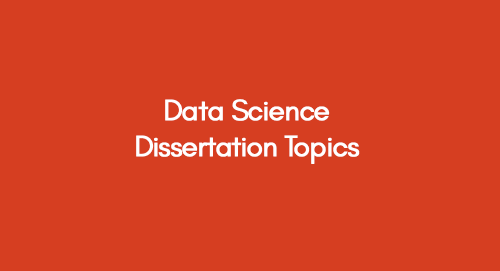
Data science is an interdisciplinary field that combines statistical and computational methods to extract insights and knowledge from data. Students in this field study statistics, programming, machine learning, data visualization, and data management using tools like Python, R, Tableau, PowerBI, AWS Azure, and programming languages. For ease of students, we offer a list of trending data science dissertation topics .
Review Our Quality Computer Science Dissertation Examples
Premier Dissertations has produced a list of the latest dissertation topics in data science for 2024 .
If you would like to choose any topic from the list below, simply drop us a WhatsApp or an Email .
You may also like to review;
Science Dissertation Topics | Neuroscience Dissertation Topics
3-Step Dissertation Process!

Get 3+ Topics

Dissertation Proposal

Get Final Dissertation
List of latest data science research topics 2024, quality research topics in data science, trending thesis topics in data science for 2024, how does it work .

Fill the Form

Writer Starts Working

3+ Topics Emailed!
Get expert advice before deciding topics in data science .
Getting expert advice before finalizing your data science project topics is crucial. Experts can guide you in choosing a relevant and feasible research area, ensuring your study aligns with current trends and challenges in data science. Their insights can help you refine your ideas and make informed decisions, setting the foundation for a successful and impactful dissertation. Seeking expert advice is like having a reliable map for your research journey, helping you navigate the complexities of data science.
Review Our Full List of Latest Research Topics
For more data science thesis topics, please keep checking our website as we keep adding new topics to our existing list of titles. GOOD LUCK!
Get an Immediate Response
Discuss your requirements with our writers
WhatsApp Us Email Us Chat with Us
Get 3+ Free Data Science Dissertation Topics within 24 hours
Your Number
Academic Level Select Academic Level Undergraduate Masters PhD
Area of Research
Discover More:
Business Administration and MBA Dissertation Topics Construction Engineering Dissertation Topics Environment and Sustainability Dissertation Topics Project Management Dissertation Topics COVID-19 Dissertation Topics Business Management Dissertation Topics Health and Safety Dissertation Topics Cryptocurrency Dissertation Topics Cyber Security Dissertation Topics Education Dissertation-Topics
admin farhan
Related posts.

Fashion Research Topics | 35+ Free Topics in 2024

100+ Correlational Research Topics
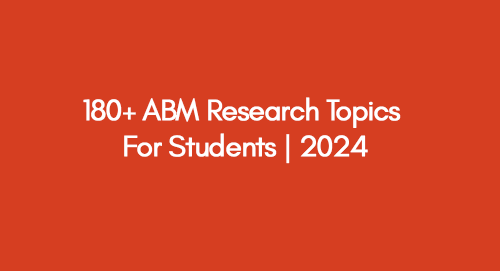
180+ ABM Research Topics For Students | 2024
Comments are closed.

Dissertation Services
- Dissertation Writing Service
- Dissertation Assistance Service
- Dissertation Consulting Service
- Buy Dissertation
- Dissertation Abstract Writing Services
- Dissertation Formatting Service
- Buy Dissertation Methodology
- Dissertation Case Study Service
- Pay For Dissertation
- Dissertation Chapter Writing Services
- Dissertation Conclusion Services
- Dissertation Data Analysis Services
- Dissertation Discussion Writing Services
- Dissertation Introduction Writing Service
- Dissertation Outline Service
- Online Dissertation Help
- Write My Dissertation
- Do My Dissertation
- Help With Thesis Writing Service
- Dissertation Writing England
- Dissertation Writing Service London
- Dissertation Writing Northern Ireland
- Dissertation Writing Scotland
- Dissertation Writing Wales
- Personal Statement Writing Service
Dissertation Subjects
- Marketing Dissertation
- Digital Marketing Dissertation
- Law Dissertation Help
- Economics Dissertation
- Accounting Dissertation
- Business Management Dissertation
- Nursing Dissertation
- Psychology Dissertation
- Social Media Marketing Dissertation
- English Literature Dissertation Help
- Finance Dissertation
- History Dissertation
- HRM Dissertation
- IT Dissertation
- Linguistics Dissertation Help
- Supply Chain Management Dissertation Help
- Health And Social Care Dissertation
Dissertation Levels
- Buy Master Dissertation
- MBA Dissertation Writing Service
- Buy PhD Dissertation
- Masters Dissertation Proposal Help
- MBA Dissertation Proposal Help
- PhD Data Collection Services
- PhD Dissertation Proposal Help
- PhD Qualitative Data Analysis Services
- Master Thesis Help
- PhD Thesis Writing Help
- PhD Dissertation Editing
- Finance Dissertation Editing
- Digital Marketing Dissertation Editing
- Accounting Dissertation Editing
- Sociology Dissertation Editing
- English Literature Dissertation Editing
- Economics Dissertation Editing
- Linguistics Dissertation Editing
- Business Management Dissertation Editing
- Psychology Dissertation Editing
- Marketing Dissertation Editing
- Academic Poster Designing Services
- Dissertation PowerPoint Presentation Service
- Dissertation Presentation Writing Services
- Literature Review Writing Service
- Primary Data Collection Service
- Qualitative Data Dissertation Services
- Research Data Collection Service
- Secondary Data Collection Help
- DISSERTATION SERVICES
- DISSERTATION SUBJECTS
- DISSERTATION LEVELS
- Buy MBA Dissertation
- PhD Dissertation Editing Services
Hire a Writer
Get an expert writer for your academic paper
Check Samples
Take a look at samples for quality assurance
- Dissertation Topics
Free customised dissertation topics for your assistance
- Data Science Research Topics
- Accounting Dissertation Topics (8)
- Banking & Finance Dissertation Topics (10)
- Business Management Dissertation Topics (35)
- Economic Dissertation Topics (1)
- Education Dissertation Topics (12)
- Engineering Dissertation Topics (9)
- English Literature Dissertation Topics (3)
- HRM Dissertation Topics (3)
- Law Dissertation Topics (13)
- Marketing Dissertation Topics (9)
- Medical Dissertation Topics (7)
- Nursing Dissertation Topics (10)
- Other Topics (10)
- Supply Chain Dissertation Topics (2)
- Biomedical Science (1)
- Business Management Research Topics (1)
- Computer Science Research Topics (1)
- Criminology Research Topics (1)
- Economics Research Topics (1)
- Google Scholar Research Topics (1)
- HR Research Topics (1)
- Law Research Topics (1)
- Management Research Topics (1)
- Marketing Research Topics (1)
- MBA Research Topics (1)
- Medical Research Topics (1)
- How To (22)
Get a native to improve your language & writing
Enjoy quality dissertation help on any topic
Qualitative & Quantitative data analysis
List of Best Research and Thesis Topic Ideas for Data Science
Data Science is one of the fastest-growing fields of the world. Along with being the fastest-growing field of the world, it is also one of the highest-paying fields of the world. There is no wonder why Data Science has reached this status as we can see that all-important decisions are highly dependent on the extraction of data and making informed decisions through it.
Table of Contents
How “Dissertation Proposal” Can Help You!
Our top dissertation writing experts are waiting 24/7 to assist you with your university project, from critical literature reviews to a complete masters dissertation.
What is Data Science and Its Importance?
Data Science means using scientific methods to analyze and extract meaningful data from a huge amount of data. Some of the most important data science topics are Data Mining, Data Manipulation, Statistics, Data Engineering, etc. What makes this field so valuable is that it contributes a lot in other fields like it is used for calculating market trends, gaining insight about customer behavior, increasing sales, detecting cyberattacks, analyzing performances of teams, diagnosing diseases, etc. All of this is enough to prove the importance of this field and that after securing a degree in this field you will have a bright and secure future.
Does Data Science is a Tough Field for Students?
While data science may seem like a dream subject to some students but they should be aware of the fact that certain aspects can turn this dream into a nightmare and the path of getting a degree in Data Science is filled with stones and thrones and writing dissertations on data science research topics is one of them. You may have a feeling of pulling out your hair only after reading problem statements of a few data science dissertation topics.
Only the process of searching for good data science dissertation ideas will make you extremely drained as picking one dissertation topic from a huge list of data science dissertation topics is a challenge on its own. No one would want to go through the horrible experience of writing a dissertation on it on his own.
We know that after hearing all this, you may have transitioned from feeling excited to feeling scared. Don’t worry you are not alone, you have a team of the most experienced Data Science dissertation writers to help you pick out a topic.
Get Free Customize Topics Now
Academic Level Undergraduate Masters PhD Others
Latest Data Science Research Topics for 2022-2023
We are mentioning some interesting Data Science Topics free of cost with objectives that will instantly approve by your professor. DissertationProposal writers also ready to provide you the Data Science topics according to your requirement free of charge.
A Comparative Study –The Implementation of Data Science into Investigations Concerning Wildfires
The research aims to explore the reason for wildfire with the particular lens of data sciences. It further explores the primary and secondary reasons to curb the intensity.
Objectives:
- To analyse the implementation of Data Science
- To evaluate the factors which influence the implementation of data science and Concerning Wildfires
- To determine the relationship between the data science and concerning wildfires
To analyse the use of Data Science in the Field of Physics
This study aim to analyse the use of data science in the field of physics. Following are the objectives of the study:
- To examine the use of data science in physics
- To understand the key concept and innovation tools for the usage of data science in physics
- To make a recommendation for the use of data science in physics.
Evaluating the Implementation of Data Science in Economic Theory
- This study aim to examine the implementation of data science in economic theory.
- To analyse the implementation of Data Science in Economic Theory.
- To examine the algorithms based machine learning design for the implementation of data science.
Evaluating the implementation of Data Science in the Teaching Profession. A comparative study
Aims and Objectives
- This study aim to analyse the implementation of Data Science into the Teaching Profession
- To understand the key concept behind the use of data science in the teaching profession
- To examine the implementation of Data Science in the Teaching Profession using strategic functions
- To evaluate the use of data science for real student involvement in the classroom
The Implementation of Data Science and their impact on the management environment and sustainability
This study aim to analyse the implementation of Data Science and their impact on the Environment and Sustainability. Following are the objectives of the study:
- To examine the implementation of data science using data-driven decision-making tools
- To evaluate the impact of modern information technology on management environment and sustainability.
- To explore the use of data science in enhancing the effectiveness and efficiency of management environment and Sustainability
Inclusion of Natural Learning Process in the Chatbot Development as a Tool for Digital Learning
To examine the effectiveness of the chatbot as a digital learning tool.
To evaluate the level of innovation through employing the chatbot in the learning programmes.
To explore the effectiveness of NLP integrated chatbot in digital learning.
Evolution of the Teaching Methods through the Implication of the Chatbots in Terms of Smart Learning
To identify the role of chatbots in evolving the traditional teaching methods.
To accentuate the motives behind the adoption of the AI integrated chatbots in off-campus or on-campus practices.
To determine the challenges pertaining to the adoption of chatbots in the educational system.
To examine the effectiveness of the AI integrated chatbots in smart learning of students.
An overview of the Algorithms of Deep Learning and its Architecture
To accentuate the various architectures of deep learning.
To explore the number of multiple layers employed by the deep neural network (DNN) with the algorithms.
To determine the efficacy of deep learning algorithms and its pertaining architecture.
The Role of Machine Learning in Facilitating the Implication of the Scientific Computing and Software Engineering
To recognise the approaches of machine learning for natural language processing.
To evaluate the role of machine learning in aiding the implementation of scientific computing through the improvement of computational tools.
To foster the effectiveness of software engineering and image classification through the implication of machine learning.
A Comparative Study of Generations of the Neural Network in the Deep Learning Model
To identify the different generations of the neural network.
To evaluate the implications of each generation of the neural network.
To compare the effectiveness of the various generations of the neural network in a deep learning model.
The Role of Individualised Evolutionary Learning in Predicting Auction Equilibria
To study the significance of individualised evolutionary learning.
To compute the bidding parameters of equilibria in the auctions.
To explore the relationship between individualised evolutionary learning and prediction of auction equilibria.
Implications of Earth Observation and Artificial Intelligence to Confront Fundamental Worldwide Environmental Threats in Support of the Sustainable Development Goals
To illustrate the significance of earth observation data.
To study the global environmental threats emerging against the sustainable development goals of the UN.
To highlight the importance of integrating the earth observation data and artificial intelligence for supporting the UN’s SDG through mitigating the evolving environmental threats.
Automated Damaged Areas Recognition and Machines Learning-Based Inpainting Techniques for Image Restoration
To explore the significance of the recognition algorithm within the image restoration programme.
To study the evolving inpainting techniques undertaken for image restoration.
To accentuate the connotation of integrating the automated damaged areas recognition with the machine learning-based inpainting techniques for the image restoration.
Predicting the Cryptocurrency’s Value by Considering the VARIMA Model’s Revolutionary Parameter Optimisation
To compare the predictive models employed to the estimation of a cryptocurrency over the period.
To evaluate the efficiency and optimisation of the VARIMA Model.
To explore the efficacy of the VARIMA model on predicting the value of cryptocurrency.
The Implication of Computational Approaches for Investigating the Behaviour Patterns of Software Developers and their Codes
To study the concerns and inadequacy of the life cycle of software development.
To investigate the limitations pertaining to the evolution of Artificial Intelligence.
To determine the significance of deploying the computational approaches in investigating the behavioural patterns of developers and emerging changes in their codes.
Consult Our Writers to Discuss Your Needs
View different varieties of dissertation topics and samples on multiple subjects for every educational level
Mon - Sat 9:00am - 12:00am
- Get a quote
List of Best Research and Thesis Topic Ideas for Data Science in 2022
In an era driven by digital and technological transformation, businesses actively seek skilled and talented data science potentials capable of leveraging data insights to enhance business productivity and achieve organizational objectives. In keeping with an increasing demand for data science professionals, universities offer various data science and big data courses to prepare students for the tech industry. Research projects are a crucial part of these programs and a well- executed data science project can make your CV appear more robust and compelling. A broad range of data science topics exist that offer exciting possibilities for research but choosing data science research topics can be a real challenge for students . After all, a good research project relies first and foremost on data analytics research topics that draw upon both mono-disciplinary and multi-disciplinary research to explore endless possibilities for real –world applications.
As one of the top-most masters and PhD online dissertation writing services , we are geared to assist students in the entire research process right from the initial conception to the final execution to ensure that you have a truly fulfilling and enriching research experience. These resources are also helpful for those students who are taking online classes .
By taking advantage of our best digital marketing research topics in data science you can be assured of producing an innovative research project that will impress your research professors and make a huge difference in attracting the right employers.
Get an Immediate Response
Discuss your requirments with our writers
Get 3 Customize Research Topic within 24 Hours
Undergraduate Masters PhD Others
Data science thesis topics
We have compiled a list of data science research topics for students studying data science that can be utilized in data science projects in 2022. our team of professional data experts have brought together master or MBA thesis topics in data science that cater to core areas driving the field of data science and big data that will relieve all your research anxieties and provide a solid grounding for an interesting research projects . The article will feature data science thesis ideas that can be immensely beneficial for students as they cover a broad research agenda for future data science . These ideas have been drawn from the 8 v’s of big data namely Volume, Value, Veracity, Visualization, Variety, Velocity, Viscosity, and Virility that provide interesting and challenging research areas for prospective researches in their masters or PhD thesis . Overall, the general big data research topics can be divided into distinct categories to facilitate the research topic selection process.
- Security and privacy issues
- Cloud Computing Platforms for Big Data Adoption and Analytics
- Real-time data analytics for processing of image , video and text
- Modeling uncertainty
How “The Research Guardian” Can Help You A lot!
Our top thesis writing experts are available 24/7 to assist you the right university projects. Whether its critical literature reviews to complete your PhD. or Master Levels thesis.
DATA SCIENCE PHD RESEARCH TOPICS
The article will also guide students engaged in doctoral research by introducing them to an outstanding list of data science thesis topics that can lead to major real-time applications of big data analytics in your research projects.
- Intelligent traffic control ; Gathering and monitoring traffic information using CCTV images.
- Asymmetric protected storage methodology over multi-cloud service providers in Big data.
- Leveraging disseminated data over big data analytics environment.
- Internet of Things.
- Large-scale data system and anomaly detection.
What makes us a unique research service for your research needs?
We offer all –round and superb research services that have a distinguished track record in helping students secure their desired grades in research projects in big data analytics and hence pave the way for a promising career ahead. These are the features that set us apart in the market for research services that effectively deal with all significant issues in your research for.
- Plagiarism –free ; We strictly adhere to a non-plagiarism policy in all our research work to provide you with well-written, original content with low similarity index to maximize chances of acceptance of your research submissions.
- Publication; We don’t just suggest PhD data science research topics but our PhD consultancy services take your research to the next level by ensuring its publication in well-reputed journals. A PhD thesis is indispensable for a PhD degree and with our premier best PhD thesis services that tackle all aspects of research writing and cater to essential requirements of journals , we will bring you closer to your dream of being a PhD in the field of data analytics.
- Research ethics: Solid research ethics lie at the core of our services where we actively seek to protect the privacy and confidentiality of the technical and personal information of our valued customers.
- Research experience: We take pride in our world –class team of computing industry professionals equipped with the expertise and experience to assist in choosing data science research topics and subsequent phases in research including findings solutions, code development and final manuscript writing.
- Business ethics: We are driven by a business philosophy that‘s wholly committed to achieving total customer satisfaction by providing constant online and offline support and timely submissions so that you can keep track of the progress of your research.
Now, we’ll proceed to cover specific research problems encompassing both data analytics research topics and big data thesis topics that have applications across multiple domains.
Get Help from Expert Thesis Writers!
TheresearchGuardian.com providing expert thesis assistance for university students at any sort of level. Our thesis writing service has been serving students since 2011.
Multi-modal Transfer Learning for Cross-Modal Information Retrieval
Aim and objectives.
The research aims to examine and explore the use of CMR approach in bringing about a flexible retrieval experience by combining data across different modalities to ensure abundant multimedia data.
- Develop methods to enable learning across different modalities in shared cross modal spaces comprising texts and images as well as consider the limitations of existing cross –modal retrieval algorithms.
- Investigate the presence and effects of bias in cross modal transfer learning and suggesting strategies for bias detection and mitigation.
- Develop a tool with query expansion and relevance feedback capabilities to facilitate search and retrieval of multi-modal data.
- Investigate the methods of multi modal learning and elaborate on the importance of multi-modal deep learning to provide a comprehensive learning experience.
The Role of Machine Learning in Facilitating the Implication of the Scientific Computing and Software Engineering
- Evaluate how machine learning leads to improvements in computational APA reference generator tools and thus aids in the implementation of scientific computing
- Evaluating the effectiveness of machine learning in solving complex problems and improving the efficiency of scientific computing and software engineering processes.
- Assessing the potential benefits and challenges of using machine learning in these fields, including factors such as cost, accuracy, and scalability.
- Examining the ethical and social implications of using machine learning in scientific computing and software engineering, such as issues related to bias, transparency, and accountability.
Trustworthy AI
The research aims to explore the crucial role of data science in advancing scientific goals and solving problems as well as the implications involved in use of AI systems especially with respect to ethical concerns.
- Investigate the value of digital infrastructures available through open data in aiding sharing and inter linking of data for enhanced global collaborative research efforts
- Provide explanations of the outcomes of a machine learning model for a meaningful interpretation to build trust among users about the reliability and authenticity of data
- Investigate how formal models can be used to verify and establish the efficacy of the results derived from probabilistic model.
- Review the concept of Trustworthy computing as a relevant framework for addressing the ethical concerns associated with AI systems.
The Implementation of Data Science and their impact on the management environment and sustainability
The aim of the research is to demonstrate how data science and analytics can be leveraged in achieving sustainable development.
- To examine the implementation of data science using data-driven decision-making tools
- To evaluate the impact of modern information technology on management environment and sustainability.
- To examine the use of data science in achieving more effective and efficient environment management
- Explore how data science and analytics can be used to achieve sustainability goals across three dimensions of economic, social and environmental.
Big data analytics in healthcare systems
The aim of the research is to examine the application of creating smart healthcare systems and how it can lead to more efficient, accessible and cost –effective health care.
- Identify the potential Areas or opportunities in big data to transform the healthcare system such as for diagnosis, treatment planning, or drug development.
- Assessing the potential benefits and challenges of using AI and deep learning in healthcare, including factors such as cost, efficiency, and accessibility
- Evaluating the effectiveness of AI and deep learning in improving patient outcomes, such as reducing morbidity and mortality rates, improving accuracy and speed of diagnoses, or reducing medical errors
- Examining the ethical and social implications of using AI and deep learning in healthcare, such as issues related to bias, privacy, and autonomy.
Large-Scale Data-Driven Financial Risk Assessment
The research aims to explore the possibility offered by big data in a consistent and real time assessment of financial risks.
- Investigate how the use of big data can help to identify and forecast risks that can harm a business.
- Categories the types of financial risks faced by companies.
- Describe the importance of financial risk management for companies in business terms.
- Train a machine learning model to classify transactions as fraudulent or genuine.
Scalable Architectures for Parallel Data Processing
Big data has exposed us to an ever –growing volume of data which cannot be handled through traditional data management and analysis systems. This has given rise to the use of scalable system architectures to efficiently process big data and exploit its true value. The research aims to analyses the current state of practice in scalable architectures and identify common patterns and techniques to design scalable architectures for parallel data processing.
- To design and implement a prototype scalable architecture for parallel data processing
- To evaluate the performance and scalability of the prototype architecture using benchmarks and real-world datasets
- To compare the prototype architecture with existing solutions and identify its strengths and weaknesses
- To evaluate the trade-offs and limitations of different scalable architectures for parallel data processing
- To provide recommendations for the use of the prototype architecture in different scenarios, such as batch processing, stream processing, and interactive querying
Robotic manipulation modelling
The aim of this research is to develop and validate a model-based control approach for robotic manipulation of small, precise objects.
- Develop a mathematical model of the robotic system that captures the dynamics of the manipulator and the grasped object.
- Design a control algorithm that uses the developed model to achieve stable and accurate grasping of the object.
- Test the proposed approach in simulation and validate the results through experiments with a physical robotic system.
- Evaluate the performance of the proposed approach in terms of stability, accuracy, and robustness to uncertainties and perturbations.
- Identify potential applications and areas for future work in the field of robotic manipulation for precision tasks.
Big data analytics and its impacts on marketing strategy
The aim of this research is to investigate the impact of big data analytics on marketing strategy and to identify best practices for leveraging this technology to inform decision-making.
- Review the literature on big data analytics and marketing strategy to identify key trends and challenges
- Conduct a case study analysis of companies that have successfully integrated big data analytics into their marketing strategies
- Identify the key factors that contribute to the effectiveness of big data analytics in marketing decision-making
- Develop a framework for integrating big data analytics into marketing strategy.
- Investigate the ethical implications of big data analytics in marketing and suggest best practices for responsible use of this technology.
Looking For Customize Thesis Topics?
Take a review of different varieties of thesis topics and samples from our website TheResearchGuardian.com on multiple subjects for every educational level.
Platforms for large scale data computing: big data analysis and acceptance
To investigate the performance and scalability of different large-scale data computing platforms.
- To compare the features and capabilities of different platforms and determine which is most suitable for a given use case.
- To identify best practices for using these platforms, including considerations for data management, security, and cost.
- To explore the potential for integrating these platforms with other technologies and tools for data analysis and visualization.
- To develop case studies or practical examples of how these platforms have been used to solve real-world data analysis challenges.
Distributed data clustering
Distributed data clustering can be a useful approach for analyzing and understanding complex datasets, as it allows for the identification of patterns and relationships that may not be immediately apparent.
To develop and evaluate new algorithms for distributed data clustering that is efficient and scalable.
- To compare the performance and accuracy of different distributed data clustering algorithms on a variety of datasets.
- To investigate the impact of different parameters and settings on the performance of distributed data clustering algorithms.
- To explore the potential for integrating distributed data clustering with other machine learning and data analysis techniques.
- To apply distributed data clustering to real-world problems and evaluate its effectiveness.
Analyzing and predicting urbanization patterns using GIS and data mining techniques".
The aim of this project is to use GIS and data mining techniques to analyze and predict urbanization patterns in a specific region.
- To collect and process relevant data on urbanization patterns, including population density, land use, and infrastructure development, using GIS tools.
- To apply data mining techniques, such as clustering and regression analysis, to identify trends and patterns in the data.
- To use the results of the data analysis to develop a predictive model for urbanization patterns in the region.
- To present the results of the analysis and the predictive model in a clear and visually appealing way, using GIS maps and other visualization techniques.
Use of big data and IOT in the media industry
Big data and the Internet of Things (IoT) are emerging technologies that are transforming the way that information is collected, analyzed, and disseminated in the media sector. The aim of the research is to understand how big data and IoT re used to dictate information flow in the media industry
- Identifying the key ways in which big data and IoT are being used in the media sector, such as for content creation, audience engagement, or advertising.
- Analyzing the benefits and challenges of using big data and IoT in the media industry, including factors such as cost, efficiency, and effectiveness.
- Examining the ethical and social implications of using big data and IoT in the media sector, including issues such as privacy, security, and bias.
- Determining the potential impact of big data and IoT on the media landscape and the role of traditional media in an increasingly digital world.
Exigency computer systems for meteorology and disaster prevention
The research aims to explore the role of exigency computer systems to detect weather and other hazards for disaster prevention and response
- Identifying the key components and features of exigency computer systems for meteorology and disaster prevention, such as data sources, analytics tools, and communication channels.
- Evaluating the effectiveness of exigency computer systems in providing accurate and timely information about weather and other hazards.
- Assessing the impact of exigency computer systems on the ability of decision makers to prepare for and respond to disasters.
- Examining the challenges and limitations of using exigency computer systems, such as the need for reliable data sources, the complexity of the systems, or the potential for human error.
Network security and cryptography
Overall, the goal of research is to improve our understanding of how to protect communication and information in the digital age, and to develop practical solutions for addressing the complex and evolving security challenges faced by individuals, organizations, and societies.
- Developing new algorithms and protocols for securing communication over networks, such as for data confidentiality, data integrity, and authentication
- Investigating the security of existing cryptographic primitives, such as encryption and hashing algorithms, and identifying vulnerabilities that could be exploited by attackers.
- Evaluating the effectiveness of different network security technologies and protocols, such as firewalls, intrusion detection systems, and virtual private networks (VPNs), in protecting against different types of attacks.
- Exploring the use of cryptography in emerging areas, such as cloud computing, the Internet of Things (IoT), and blockchain, and identifying the unique security challenges and opportunities presented by these domains.
- Investigating the trade-offs between security and other factors, such as performance, usability, and cost, and developing strategies for balancing these conflicting priorities.
Meet Our Professionals Ranging From Renowned Universities
Related topics.
- Sports Management Research Topics
- Special Education Research Topics
- Software Engineering Research Topics
- Primary Education Research Topics
- Microbiology Research Topics
- Luxury Brand Research Topics
- Cyber Security Research Topics
- Commercial Law Research Topics
- Change Management Research Topics
- Artificial intelligence Research Topics

Home > CCSE > Data Science and Analytics > PhD DSA
Doctor of Data Science and Analytics Dissertations
The PhD Website
The Ph.D. in Data Science and Analytics is an advanced degree with a dual focus of application and research - where students will engage in real world business problems, which will inform and guide their research interests.
We launched the first formal PhD program in Data Science in 2015. Our program sits at the intersection of computer science, statistics, mathematics, and business. Our students engage in relevant research with faculty from across our eleven colleges. As one of the institutions on the forefront of the development of data science as an academic discipline, we are committed to developing the next generation of Data Science leaders, researchers, and educators. Culturally, we are committed to the discipline of Data Science, through ethical practices, attention to fairness, to a diverse student body, to academic excellence, and research which makes positive contributions to our local, regional, and global community. -Sherry Ni, Director, Ph.D. in Data Science and Analytics
This degree will train individuals to translate and facilitate new innovative research, structured and unstructured, complex data into information to improve decision making. This curriculum includes heavy emphasis on programming, data mining, statistical modeling, and the mathematical foundations to support these concepts. Importantly, the program also emphasizes communication skills – both oral and written – as well as application and tying results to business and research problems.
Need to Submit Your Dissertation? Submit Here!
Dissertations from 2024 2024.
A Holistic and Collaborative Behavioral Health Detection Framework Using Sensitive Police Narratives , Martin Keagan Wynne Brown
Multi-Modality Transformer for E-Commerce: Inferring User Purchase Intention to Bridge the Query-Product Gap , Srivatsa Mallapragada
Dissertations from 2023 2023
Quantification of Various Types of Biases in Large Language Models , Sudhashree Sayenju
Dissertations from 2022 2022
Appley: Approximate Shapley Values for Model Explainability in Linear Time , Md Shafiul Alam
Ethical Analytics: A Framework for a Practically-Oriented Sub-Discipline of AI Ethics , Jonathan Boardman
Novel Instance-Level Weighted Loss Function for Imbalanced Learning , Trent Geisler
Debiasing Cyber Incidents – Correcting for Reporting Delays and Under-reporting , Seema Sangari
Dissertations from 2021 2021
Integrated Machine Learning Approaches to Improve Classification performance and Feature Extraction Process for EEG Dataset , Mohammad Masum
A Distance-Based Clustering Framework for Categorical Time Series: A Case Study in Episodes of Care Healthcare Delivery System , Lauren Staples
Dissertations from 2020 2020
A CREDIT ANALYSIS OF THE UNBANKED AND UNDERBANKED: AN ARGUMENT FOR ALTERNATIVE DATA , Edwin Baidoo
Quantitatively Motivated Model Development Framework: Downstream Analysis Effects of Normalization Strategies , Jessica M. Rudd
Data-driven Investment Decisions in P2P Lending: Strategies of Integrating Credit Scoring and Profit Scoring , Yan Wang
A Novel Penalized Log-likelihood Function for Class Imbalance Problem , Lili Zhang
ATTACK AND DEFENSE IN SECURITY ANALYTICS , Yiyun Zhou
Dissertations from 2019 2019
One and Two-Step Estimation of Time Variant Parameters and Nonparametric Quantiles , Bogdan Gadidov
Biologically Interpretable, Integrative Deep Learning for Cancer Survival Analysis , Jie Hao
Deep Embedding Kernel , Linh Le
Ordinal HyperPlane Loss , Bob Vanderheyden
Advanced Search
- Notify me via email or RSS
- All Collections
- Disciplines
- Conferences
- Faculty Works
- Open Access
- Research Support
- Student Works
- Data Science Homepage
Useful Links
- Training Materials
Home | About | FAQ | My Account | Accessibility Statement
Privacy Copyright DigitalCommons@Kennesaw State University ISSN: 2576-6805

- Why Choose Us
- Vision and Mission
- Hire Writers
- How it Works
Latest Data Science Dissertation Topics to Grab Reader's Attention
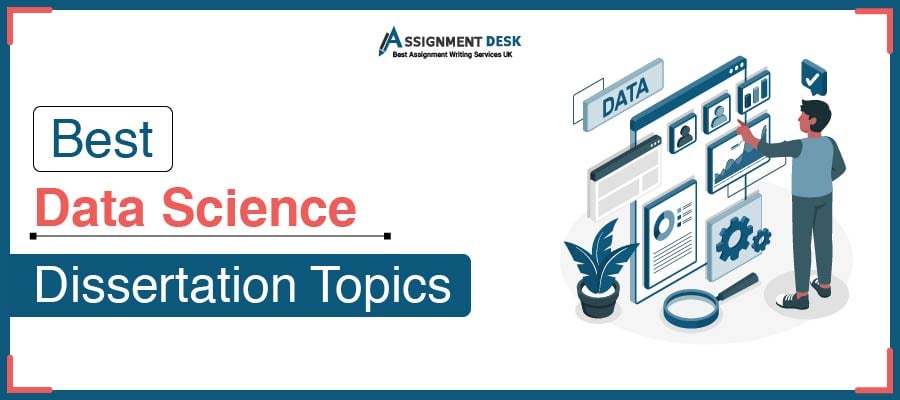
Table of Content
Explore Transformative Patterns
Innovation of new products, best data science dissertation topics, trending data science dissertation topics, compelling data science dissertation topics, data science dissertation topics to score well, unique data science dissertation topics, pick the meaningful topic, work with consistent data, ease the complexity of the model, acknowledge the day to day problems.
Data science is one of the fastest growing fields in present times, which makes it one of the befitting subjects among students. But, getting a degree in the field is not a piece of cake, as you have to overcome several hurdles. One such problem is to draft an ideal dissertation. Although, creating a paper can be easier when you have a precise topic. Thus, this blog will help you to explore data science dissertation topics to ease your workload. So, to begin with, have an insight into what the data science field is and why it is necessary.
Need Personalised Assistance from Our Experts?
Share Your Requirements via Whatsapp!
What Is Data Science and Its Importance?
Data science is a field that studies data to extract valuable insights for a business. In other words, it is a means to use scientific techniques to evaluate and extract meaningful information from the ocean of data. Moreover, as per professional data science dissertation writers, it is an interdisciplinary approach that combines practices and principles of several fields. These subjects are mathematics, statistics, computer engineering, and artificial intelligence. However, you can learn all these in the dissertation writing process, which is a crucial thing in academics. Furthermore, its importance and use is increasing day by day in the field to:
Data science enables a business to explore new relationships and patterns that have the ability to transform the organisation and take it to new heights. Moreover, it can evaluate the low cost of resource management to get higher profits.
Data science has the capability to reveal the gaps and the problems present the existing information that might go unnoticed otherwise. You can do it by evaluating the purchase decisions, consumer preferences, business process and more.
After gaining insight into data science and perceiving its importance, it is time to move ahead. Constructing a dissertation while you are pursuing your academic journey is necessary. Although it is a challenging task, but referring to online dissertation help can guide you on the right track. To move forward, explore the topics you can use to frame your dissertation and impress your professor.
A List of Latest Data Science Dissertation Topics
In this section of the blog, you will explore dissertation topics in data science that you can use to build your paper on. These are shortlisted by the experts that will help you leave an impression on your professor and grab your readers' attention. Thus, begin to perceive them all listed by the professional dissertation writers in UK :
Here are the hand-picked dissertation topics for data science that can help you grab the reader's attention quickly and without too much effort.
1. Compare the implementation of data science in various investigations concerning wildfires.
2. Explain the K-means clustering from the perspective of online spherical.
3. Explore how linear and nonlinear regression analyses' efficacy can be increased.
4. Evaluate the platforms for big data computing: Big data analytics and the adoption.
5. Discuss the best data management strategies for modern enterprises to use.
As you know, trends are changing rapidly in every field, and you have to cope with them to grow. Thus, in this section, you will find some of the most trending data science dissertation ideas to adjust to the changing things.
6. Explain massive data processing and the appropriate key management system.
7. Discuss the deep learning process and its relevance in the field.
8. What is the application of big data in improving supply chain management of an institution?
9. Analyse the implementation of data science in economic theory.
10. What is the use of big data analytics to power AI and ML?
Need Help with Dissertation?
Get a 100% Original Dissertation Written by EXPERTS
Attracting the readers and making them stick to the end of the document is the most challenging task. But, if you have chosen ideal MSC data science dissertation topics, you can ace it easily. Thus, here are some of them:
11. Explain the Hadoop programming and the map-reduce architecture.
12. What is hyper-personalisation and its importance in the field?
13. Explore the value big data provides to innovation management.
14. Perform a comparative study on the implementation of data science in the teaching profession.
15. Overview of data valuation and why it matters in data management.
The motive behind constructing a dissertation is to score well apart from studying the subject. Thus, to make the paper effective, you can either buy dissertation service or select a topic which has the potential to fetch you good grades. So, here are some of the appropriate data science dissertation ideas:
16. Have a discussion about the MATLAB code for decision trees along with semantic data governance.
17. What is the necessity of big data technologies for modern businesses?
18. State the societal implications of using predictive analytics within education.
19. Mention the association rule learning regarding data mining.
20. Give an overview of the relevance of Artificial Intelligence.
Struggling to Find Best Dissertation Topic?
Get a Unique Title & Dissertation Proposal Outline for FREE!
You must know that uniqueness is the key towards an ideal dissertation. Thus, in this section, you will explore the unique data science dissertation topics that will help you achieve your goal.
21. What is the implementation of data science, and how does it impact the management environment and sustainability?
22. How to apply attribute-access or role-based access control in an organisation?
These are some of the dissertation topics for data science that will help you ease the process of selecting the topic. So, move ahead to know the technique that you can implement and find the perfect data science research topics for your paper.
How to Choose a Data Science Dissertation Topic?
This section of the blow will help you plan your dissertation topic selection process to smoothen the path. So, read further to perceive the procedure that you should follow while selecting data science dissertation topics:
As you know, there is a never-ending list of data science dissertation topics you can choose from and build your paper on. But you are opting for the appropriate one within your interest and trending simultaneously. However, if it is challenging for you, check examples of dissertation that can rescue you.
Due to the variety of data science dissertation topics available, you must choose the one with consistent data. It means some topics do not have an accurate amount of information available to research. So, to ensure that you do not get stuck in the middle, you must ensure that the theme you are opting for has a consistent flow of information.
While finalising the data science dissertation topics, you need to ensure that it does not have a complex model to work with. It is so because, sometimes, for the sake of uniqueness, students go for the topic with complicated theories. Thus, it makes them struggle and confuses them while creating the paper. So, to ensure a smooth process, you must work on something with lower complexity.
While selecting a theme, you must keep yourself updated with the daily problems faced by the targeted audience. You can refer to the data science dissertation examples available to understand this better. It is crucial as it will grab the attention of the audience faster, and they can connect with it easily. To do this, enhance your knowledge in the field you are working in.
These were some easy steps that you should adhere to while selecting ideal dissertation topics for data science. So, if you are still struggling with the topics, you can seek professional help.
Stuck with Data Science Dissertation Topics? We Can Help
The data science dissertation topics listed in the blog are more than enough, and you must have found the one that perfectly fits your interest area. However, if you are still stuck with dissertation topic and want to explore more, our team of experts is there. Moreover, we can guide you with other challenging areas that might become a hurdle in your way. So, when you seek our data science dissertation help, you will get the following:
- 100% Unique Data
- On-Time Delivery
- 24/7 Assistance
- Affordable Prices
- Six Free Tools
- Flawless Content
It is not the end, as you can avail of several other benefits when you hire us to assist you. Moreover, seeking help from the experts at the Assignment Desk will not burn a hole in your pocket as the prices will fit into your budget.
Let Us Help With Dissertation
Share Your Requirements Now for Customized Solutions.
Delivered on-time or your money back
Our Services
- Assignment Writing Service
- Essay Writing Help
- Dissertation Writing Service
- Coursework Writing Service
- Proofreading & Editing Service
- Online Exam Help
- Term paper writing service
- Ghost Writing Service
- Case Study Writing Service
- Research Paper Writing Service
- Personal Statement Writing Service
- Resume Writing Service
- Report Writing Service
To Make Your Work Original
Check your work against paraphrasing & get a free Plagiarism report!
Check your work against plagiarism & get a free Plagiarism report!
Quick and Simple Tool to Generate Dissertation Outline Instantly
Get citations & references in your document in the desired style!
Make your content free of errors in just a few clicks for free!
Generate plagiarism-free essays as per your topic’s requirement!
Generate a Compelling Thesis Statement and Impress Your Professor
FREE Features
- Topic Creation USD 3.87 FREE
- Outline USD 9.33 FREE
- Unlimited Revisions USD 20.67 FREE
- Editing/Proofreading USD 28 FREE
- Formatting USD 8 FREE
- Bibliography USD 7.33 FREE
Get all these features for
USD 80.67 FREE
RELATED BLOGS

Check Out Top 65+ International Business Dissertation Topics

50+ In- Depth Geography Dissertation Ideas & Topics [2024]

A Comprehensive List of 35+ Trending Brexit Dissertation Topics

Interesting 40+ Early Childhood Studies Dissertation Ideas

Top 50 Unique Topics for Writing Palliative Care Dissertation
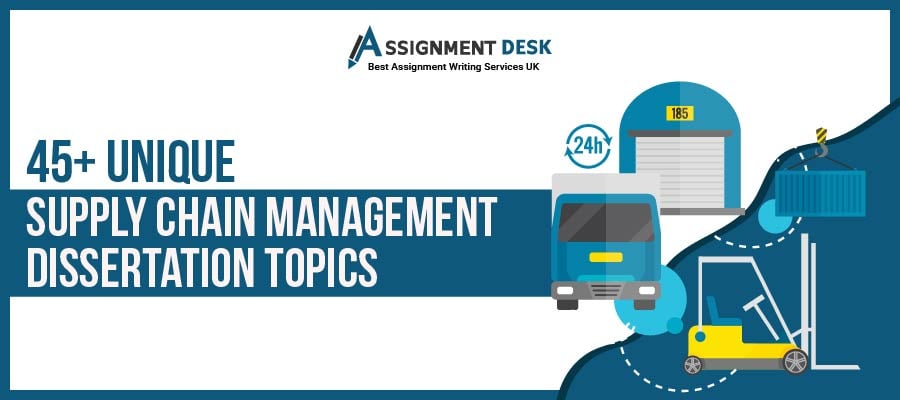
45+ Best Supply Chain Management Dissertation Topics 2024
Professional assignment writers.
Choose a writer for your task among hundreds of professionals

Please rotate your device
We don't support landscape mode yet. Please go back to portrait mode for the best experience
We use cookies to ensure that we give you the best experience on our website. If you continue to use this site we will assume that you are happy with it. Know more
Calculate the Price
Professional Academic Help at Pocket-Friendly Prices!
Estimated Price
Limited Time Offer
Exclusive Library Membership + FREE Wallet Balance
1 Month Access !
5000 Student Samples
10,000 Answers by Experts
Get $300 Now

The chair typically offers various thesis topics each semester in the areas computational statistics, machine learning, data mining, optimization and statistical software. You are welcome to suggest your own topic as well .
Before you apply for a thesis topic make sure that you fit the following profile:
- Knowledge in machine learning.
- Good R or python skills.
Before you start writing your thesis you must look for a supervisor within the group.
Send an email to the contact person listed in the potential theses topics files with the following information:
- Planned starting date of your thesis.
- Thesis topic (of the list of thesis topics or your own suggestion).
- Previously attended classes on machine learning and programming with R.
Your application will only be processed if it contains all required information.
Potential Thesis Topics
[Potential Thesis Topics] [Student Research Projects] [Current Theses] [Completed Theses]
Below is a list of potential thesis topics. Before you start writing your thesis you must look for a supervisor within the group.
Available thesis topics
Disputation.
The disputation of a thesis lasts about 60-90 minutes and consists of two parts. Only the first part is relevant for the grade and takes 30 minutes (bachelor thesis) and 40 minutes (master thesis). Here, the student is expected to summarize his/her main results of the thesis in a presentation. The supervisor(s) will ask questions regarding the content of the thesis in between. In the second part (after the presentation), the supervisors will give detailed feedback and discuss the thesis with the student. This will take about 30 minutes.
- How do I prepare for the disputation?
You have to prepare a presentation and if there is a bigger time gap between handing in your thesis and the disputation you might want to reread your thesis.
- How many slides should I prepare?
That’s up to you, but you have to respect the time limit. Prepariong more than 20 slides for a Bachelor’s presentation and more than 30 slides for a Master’s is VERY likely a very bad idea.
- Where do I present?
Bernd’s office, in front of the big TV. At least one PhD will be present, maybe more. If you want to present in front of a larger audience in the seminar room or the old library, please book the room yourself and inform us.
- English or German?
We do not care, you can choose.
- What do I have to bring with me?
A document (Prüfungsprotokoll) which you get from “Prüfungsamt” (Frau Maxa or Frau Höfner) for the disputation.Your laptop or a USB stick with the presentation. You can also email Bernd a PDF.
- How does the grading work?
The student will be graded regarding the quality of the thesis, the presentation and the oral discussion of the work. The grade is mainly determined by the written thesis itself, but the grade can improve or drop depending on the presentation and your answers to defense questions.
- What should the presentation cover?
The presentation should cover your thesis, including motivation, introduction, description of new methods and results of your research. Please do NOT explain already existing methods in detail here, put more focus on novel work and the results.
- What kind of questions will be asked after the presentation?
The questions will be directly connected to your thesis and related theory.
Student Research Projects
We are always interested in mentoring interesting student research projects. Please contact us directly with an interesting resarch idea. In the future you will also be able to find research project topics below.
Available projects
Currently we are not offering any student research projects.
For more information please visit the official web page Studentische Forschungsprojekte (Lehre@LMU)
Current Theses (With Working Titles)
Completed theses, completed theses (lmu munich), completed theses (supervised by bernd bischl at tu dortmund).
20 Data Science Topics and Areas
It is no doubt that data science topics and areas are some of the hottest business points today.
We collected some basic and advanced topics in data science to give you ideas on where to master your skills.
In today’s landscape, businesses are investing in corporate data science training to enhance their employees’ data science capabilities.
Data science topics also are hot subjects you can use as directions to prepare yourself for data science job interview questions.
1. The core of data mining process
This is an example of a wide data science topic.
What is it?
Data mining is an iterative process that involves discovering patterns in large data sets. It includes methods and techniques such as machine learning, statistics, database systems and etc.
The two main data mining objectives are to find out patterns and establish trends and relationship in a dataset in order to solve problems.
The general stages of the data mining process are: problem definition, data exploration, data preparation, modeling, evaluation, and deployment.
Core terms related to data mining are classification, predictions, association rules, data reduction, data exploration, supervised and unsupervised learning, datasets organization, sampling from datasets, building a model and etc.
2. Data visualization
Data visualization is the presentation of data in a graphical format.
It enables decision-makers of all levels to see data and analytics presented visually, so they can identify valuable patterns or trends.
Data visualization is another broad subject that covers the understanding and use of basic types of graphs (such as line graphs, bar graphs, scatter plots , histograms, box and whisker plots , heatmaps.
You cannot go without these graphs. In addition, here you need to learn about multidimensional variables with adding variables and using colors, size, shapes, animations.
Manipulation also plays a role here. You should be able to rascal, zoom, filter, aggregate data.
Using some specialized visualizations such as map charts and tree maps is a hot skill too.
3. Dimension reduction methods and techniques
Dimension Reduction process involves converting a data set with vast dimensions into a dataset with lesser dimensions ensuring that it provides similar information in short.
In other words, dimensionality reduction consists of series of techniques and methods in machine learning and statistics to decrease the number of random variables.
There are so many methods and techniques to perform dimension reduction.
The most popular of them are Missing Values, Low Variance, Decision Trees, Random Forest, High Correlation, Factor Analysis, Principal Component Analysis, Backward Feature Elimination.
4. Classification
Classification is a core data mining technique for assigning categories to a set of data.
The purpose is to support gathering accurate analysis and predictions from the data.
Classification is one of the key methods for making the analysis of a large amount of datasets effective.
Classification is one of the hottest data science topics too. A data scientist should know how to use classification algorithms to solve different business problems.
This includes knowing how to define a classification problem, explore data with univariate and bivariate visualization, extract and prepare data, build classification models, evaluate models, and etc. Linear and non-linear classifiers are some of the key terms here.
5. Simple and multiple linear regression
Linear regression models are among the basic statistical models for studying relationships between an independent variable X and Y dependent variable.
It is a mathematical modeling which allows you to make predictions and prognosis for the value of Y depending on the different values of X.
There are two main types of linear regression: simple linear regression models and multiple linear regression models.
Key points here are terms such as correlation coefficient, regression line, residual plot, linear regression equation and etc. For the beginning, see some simple linear regression examples .
6. K-nearest neighbor (k-NN)
N-nearest-neighbor is a data classification algorithm that evaluates the likelihood a data point to be a member of one group. It depends on how near the data point is to that group.
As one of the key non-parametric method used for regression and classification, k-NN can be classified as one of the best data science topics ever.
Determining neighbors, using classification rules, choosing k are a few of the skills a data scientist should have. K-nearest neighbor is also one of the key text mining and anomaly detection algorithms .
7. Naive Bayes
Naive Bayes is a collection of classification algorithms which are based on the so-called Bayes Theorem .
Widely used in Machine Learning, Naive Bayes has some crucial applications such as spam detection and document classification.
There are different Naive Bayes variations. The most popular of them are the Multinomial Naive Bayes, Bernoulli Naive Bayes, and Binarized Multinomial Naive Bayes.
8. Classification and regression trees (CART)
When it comes to algorithms for predictive modeling machine learning, decision trees algorithms have a vital role.
The decision tree is one of the most popular predictive modeling approaches used in data mining, statistics and machine learning that builds classification or regression models in the shape of a tree (that’s why they are also known as regression and classification trees).
They work for both categorical data and continuous data.
Some terms and topics you should master in this field involve CART decision tree methodology, classification trees, regression trees, interactive dihotomiser, C4.5, C5.5, decision stump, conditional decision tree, M5, and etc.
9. Logistic regression
Logistic regression is one of the oldest data science topics and areas and as the linear regression, it studies the relationship between dependable and independent variable.
However, we use logistic regression analysis where the dependent variable is dichotomous (binary).
You will face terms such as sigmoid function, S-shaped curve, multiple logistic regression with categorical explanatory variables, multiple binary logistic regression with a combination of categorical and continuous predictors and etc.
10. Neural Networks
Neural Networks act as a total hit in the machine learning nowadays. Neural networks (also known as artificial neural networks) are systems of hardware and/or software that mimic the human brain neurons operation.
The above were some of the basic data science topics. Here is a list of more interesting and advanced topics:
11. Discriminant analysis
12. Association rules
13. Cluster analysis
14. Time series
15. Regression-based forecasting
16. Smoothing methods
17. Time stamps and financial modeling
18. Fraud detection
19. Data engineering – Hadoop, MapReduce, Pregel.
20. GIS and spatial data
For continuous learning, explore online data science courses for mastering these topics.
What are your favorite data science topics? Share your thoughts in the comment field above.
About The Author
Silvia Valcheva
Silvia Valcheva is a digital marketer with over a decade of experience creating content for the tech industry. She has a strong passion for writing about emerging software and technologies such as big data, AI (Artificial Intelligence), IoT (Internet of Things), process automation, etc.
Leave a Reply Cancel Reply
This site uses Akismet to reduce spam. Learn how your comment data is processed .
16 Best Data Science Project Ideas & Topics for Beginners [2024]
![data science dissertation topics 16 Best Data Science Project Ideas & Topics for Beginners [2024]](https://www.upgrad.com/__khugblog-next/image/?url=https%3A%2F%2Fd14b9ctw0m6fid.cloudfront.net%2Fugblog%2Fwp-content%2Fuploads%2F2021%2F01%2F1293.png&w=1920&q=75)
In this Article, you will learn about 16 exciting data science project ideas & topics for beginners.
1. Beginner Level | Data Science Project Ideas
- Fake News Detection
- Human Action Recognition
- Forest Fire Prediction
- Road Lane Line Detection
2 . Data Science Projects Ideas | Intermediate Level
- Recognition of Speech Emotion
- Gender and Age Detection with Data Science
- Driver Drowsiness Detection in Python
- Handwritten Digit & Character Recognition Project
3. Advance Level Data Science Projects Ideas
- Credit Card Fraud Detection Project
- Customer Segmentations
- Traffic Signs Recognition
4. Top Data Analytics Projects
- Web Scraping
- Data Cleaning
- Exploratory Data Analysis
- Sentiment Analysis
Read more to know each in detail.
Best Data Science Project Ideas
We have segmented all the Data Science Project Ideas with source code as per the learner’s level. Therefore, you will get a list of a few amazing project briefs for beginner, intermediate & advanced Data Science project ideas.
Our learners also read : Free excel courses !
This list of data science project ideas for college students is suited for beginners, and those just starting out with Python or Data Science in general. These data science project ideas will get you going with all the practicalities you need to succeed in your career as a data science developer.
Must read : Data structures and algorithms free course !
Further, if you’re looking for data science project ideas for final year, this list should get you going. So, without further ado, let’s jump straight into some data science project ideas that will strengthen your base and allow you to climb up the ladder.
1.1 Climate Change Impacts on the Global Food Supply
The first one to make it to the list of data science projects for beginners is climate change impacts on the global food supply.
Frequent Climate change and irregularities are big challenging environmental issues. These irregularities in climate divisions are drastically affecting the human lives residing on the Earth. This Data Science Project concentrates on how the climate impact will highly affect global food production worldwide and how much quantification will impact climate change.
The main aim of development for this project is to calculate the potentialities on the staple crop productions due to climate change. Through this project, all the implications related to temperatures & precipitation change. It will then be taken into account how much carbon dioxide affects the growth of plants and the uncertainties happening in the climatic conditioning. Hence, this project will largely deal with Data Visualisations. It will also compare the production in various regions at different time zones.
Source Code: Climate Change Impacts on the Global Food Supply
Also, visit upGrad’s Degree Counselling page for all undergraduate and postgraduate programs.
upGrad’s Exclusive Data Science Webinar for you –
How to Build Digital & Data Mindset
1.2 Fake News Detection
You can drive your Data Science career with this amazing Data Science Project idea for beginners – Detection of Fake News using Python language. The act of wrong or misleading journalism on a digital platform or fake news can be detected by this project. Falsifications are spreading out via social media platforms and online channels & digital media to attain any political agenda.
With this data science project idea, you can use Python language to develop a specific model that can precisely detect whether the news is real journalism or false information.. For this, you need to build a ‘TfidfVectorizer’ classifier and then use a ‘PassiveAggressiveClassifier’ to classify the news into either a “Real” and “Fake” segmentations. There will be a dataset of the shape of 7796×4 dimensions and execute all these in the ‘JupyterLab’.
The main idea of this Data Science project is to develop a real-time machine learning model that can correctly detect social media news authenticity. ‘TF’, commonly known as ‘Term Frequency’, is the total number of times any word will appear in a single document. Whereas, ‘IDF’ or ‘Inverse Document Frequency’ is a calculative measure of the value of a word & it is based on the reputational frequency of its occurrence appearing in the various documents.
The theory is on the ‘Common words’, if these common words happen to appear in multiple documents with a high frequency then they are considered as less important words. So, what ‘TFIDFVectorizer’ does is to analyze the collection of these documents and then accordingly create a ‘TF-IDF’ matrix to it.
Along with this, a ‘PassiveAggressive’ classifier will remain ‘passive’ in case the ‘classification outcome’ is correct; but on the other hand, it will change aggressively if the ‘classification outcome’ is incorrect. So, you can create a machine learning model to detect social media news to be genuine or fake news using this Data Science Project idea.
Source Code: Fake News Detection
Explore our Popular Data Science Courses
1.3 human action recognition.
This is a Data Science project on the human action recognition model. It will look at the short videos made on human beings where they are performing specific actions. This model tries to do a classification that is based on actions performed. In this Data science project, you need to use a complex neural network. This neural network is then trained on a specific dataset that contains these short videos. Then there is an accelerometer data that is associated with the dataset. The accelerometer data conversion is done first along with a ‘time-sliced’ representation. Thereafter, you have to use the ‘ Keras ’ library so that you can do training, validation, and testing of the network based on these datasets.
Source Code: Human Action Recognition
1.4 Forest Fire Prediction
One of the alarming & common disasters happening in today’s world is forest fires. These disasters are highly damaging to the ecosystem. To deal with such a disaster, a lot of money on infrastructure & controlling and handling is required. We can build a Data Science project using ‘k-means clustering’- it can identify any forest fires hotspots along with the severity of the fire at that particular spot.
It can be alternatively used for better resource allocation with the faster response time. Hence, using the meteorological data such as those seasons around which these kinds of fires tragedies are more likely to happen and various weather conditions that worsen them may increase these results’ accuracy levels.
Source Code: Forest Fire Prediction
1.5 Road Lane Line Detection
Another Data Science project ideas for beginners include a Live Lane-Line Detection Systems built-in Python language. In this project, a human driver receives guidance on lane detections through lines drawn on the road.
Not only this, it further refers to which direction the driver should steer their vehicle. This Data Science Project application is vital for the development of driverless cars. Hence, you can also develop an application with the powerful capability to identify a track line through the input images or via a continuous video frame.
Source Code: Road Lane Line Detection
Read: Top 4 Data Analytics Project Ideas: Beginner to Expert Level
2. Data Science Projects Ideas |Intermediate Level
2.1 recognition of speech emotion .
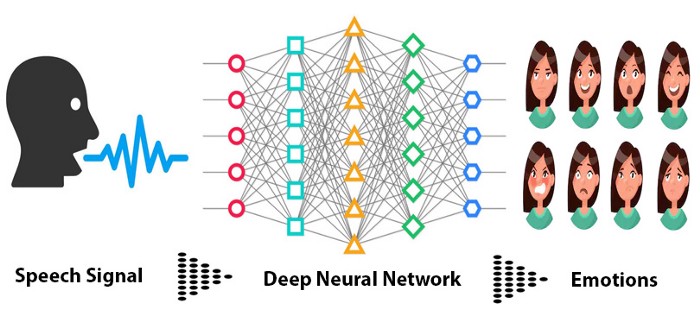
One of the popular Data Science project ideas is recognition of the speech emotion. If you want to learn the usage of different libraries, this project is perfect for you. You must have seen a lot of editor tools that can tell us how our speech emotion is appearing. This program model can be built as a Data Science project.
In this Data Science project, we will use ‘librosa’ that will perform a ‘Speech Emotion Recognition’ for us. The SER process is a trial process that can recognize human emotion. It can also recognise the speech from the affective states. As we use a combination of a tone and a pitch for expressing emotions through our voice.
The Speech Emotion Recognition model is absolutely possible. However, it can be a challenging project to perform as human emotions are very subjective. The annotation of the human audio is also quite challenging. So, here you will use the mfcc, mel & the chroma features. With this, you will also use the dataset known as ‘RAVDESS’ for the emotion recognition process. In this Data Science project, you will also learn how to develop an ‘MLPClassifier’ for this model.
Source Code: Recognition of Speech Emotion
2.2 Gender and Age Detection with Data Science
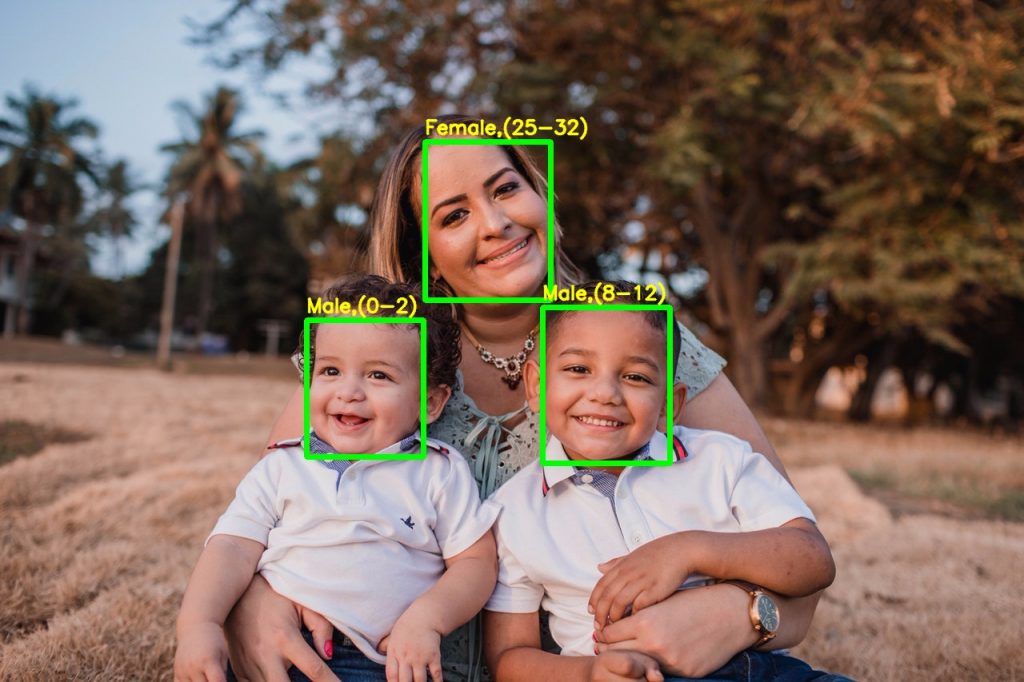
So, one of the impressive project ideas on Data Science is the ‘Gender and Age Detection with OpenCV’. With this kind of real-time project, you can easily grab your recruiter’s attention in a Data Science interview.
Talking about the project, the ‘Gender and Age Detection’ is a machine learning project based on computer visioning. Through this Data Science Project, you can learn the practical application of CNN i.e, the convolutional neural networks. Down the line, you will also use models that are trained by ‘Tal Hassner’ and ‘Gil Levi’ for ‘Adience’ dataset.
Along with this, you will also use some files such as – .pb, .prototxt, .pbtxt, & .caffemodel files. Heard about these terms? Read about these files? Understand models too? But do you know how to implement them? Well, you can learn it if you opt to develop a Data Science Project on it.
It’s a very practical project as you will create a model that can detect any human being’s age & gender through analyses of single face detection via an image. So, with this gender classification in a man or a woman can be classified. Also, the age can be classified among the ranges of 0-2/ 4-6/ 8- 2/ 15-20/ 25-32/ 38-43/ 48-53/ 60-100.
But due to various factors such as makeup, or brighter dim lighting, or an unusual facial expression, the recognition of the gender and the age from a single source can become challenging. Therefore, in this Data Science project, you will use a classification model instead of a regression model. A lot of practical & technical learning can be grabbed to upscale your technical skills with these kinds of projects. So, take up the challenge & work hard towards it to make an impressive Data Science Resume.
Source Code: Gender and Age Detection with Data Science
Top Data Science Skills to Learn
2.3 driver drowsiness detection in python.
An excellent Data Science project idea for intermediate levels is the ‘Keras & OpenCV Drowsiness Detection System’. Driving overnight is not only tough but a risky job too. We have heard of a lot of cases where accidents happen because the driver fell asleep while driving.
Thus, this project can help prevent numerous road accidents that happen due to such cases. This project’s main aim is to recognize whenever the driver may get drowsy & fall asleep while driving. This project uses Python language where you can build a model that can timely detect the sleepy driver behavior and raises an alert alarm through a high beeping alarm.
In this project, you can implement a ‘deep learning model’ & with its use, you can do a classification among images where a human eye is open or close. Not just this, in this model another formula line is to calculate the score.
This score is based on the time period of how long the eyes remain closed. The score is maintained throughout the driving session. If that score increases & crosses a specified threshold, this model will throw workflow automation through which the alarm will start buzzing heavily.
So, with these kinds of Data Science projects implementations, you will learn all the basics of Data Science projects. You will implement it using ‘Keras’ and ‘OpenCV’. So, why are these used? Well, you are using ‘OpenCV’ to detect face & eye movements. Whereas, with ‘Keras’, you can classify the eye’s state whether it is open or close while using techniques of the Deep neural network.
Source Code: Driver Drowsiness Detection in Python
Data Science Advanced Certification, 250+ Hiring Partners, 300+ Hours of Learning, 0% EMI "}" data-sheets-userformat="{"2":14524,"5":{"1":[{"1":2,"2":0,"5":{"1":2,"2":0}},{"1":0,"2":0,"3":3},{"1":1,"2":0,"4":1}]},"6":{"1":[{"1":2,"2":0,"5":{"1":2,"2":0}},{"1":0,"2":0,"3":3},{"1":1,"2":0,"4":1}]},"7":{"1":[{"1":2,"2":0,"5":{"1":2,"2":0}},{"1":0,"2":0,"3":3},{"1":1,"2":0,"4":1}]},"8":{"1":[{"1":2,"2":0,"5":{"1":2,"2":0}},{"1":0,"2":0,"3":3},{"1":1,"2":0,"4":1}]},"10":2,"14":{"1":2,"2":0},"15":"Calibri","16":11}"> Data Science Advanced Certification, 250+ Hiring Partners, 300+ Hours of Learning, 0% EMI
2.4 Chatbots

Chatbots are increasingly becoming popular these days. So, for a Data Science project, it is a high on-demand requirement by almost all organizations. It is an essential segment of the business nowadays. These days, chatbots are playing a very crucial role in businesses. They are helping business lines to save an enormous amount of time on their human resources. It is used to provide an improved and personalized business service simultaneously.
There are many businesses who are offering services to their customers. To provide customer service on a large scale, it requires a lot of human resources, ample time, and many efforts to handle each customer on time. On the other hand, these chatbots can provide automation for customer interaction services simply by answering a set of frequent questions commonly inquired by the customers.
There are 2 types of chatbots available in today’s time: Domain-specific chatbot and Open-domain chatbot. The domain-specific chatbot is most often used for a particular problem solution. These are customized in a very strategic & smart manner so that they work strategically & effectively in relation to domain specifications. The second one, ‘Open-domain’ chatbots, needs a lot of training materials that are too continuously because, as per the name, it is developed to answer any kind of question.
Technically speaking, the chatbots are trained using the ‘ Deep Learning ’ techniques. They need a dataset with vocabulary listing, lists consisting of a common sentence, an intent which is behind them, and then the appropriate responses. This is one of the trending data science project ideas.
The ‘Recurring Neural Networks’ (The RNN’s) are the common methodologies to train chatbots. These bots contain encoders that can update the states as per the input sentences alongside intent. It then passes the specified state to the Chatbot.
Thereafter, the chatbot uses the decoder to search an appropriate & subsequent response according to inputted words & also besides the intent. With this Data Science project, you can easily learn Python language implementation as the complete project is itself made in Python. You can upscale your Python technical skills to a certain extent.
Source Code: Chatbots
Learn: How to Make a Chatbot in Python Step By Step
2.5 Handwritten Digit & Character Recognition Project
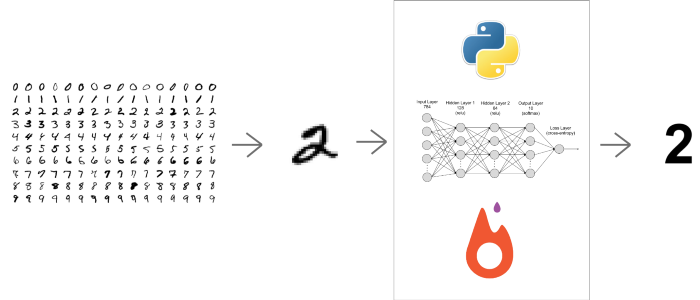
With this Data Science Project idea on ‘Handwritten Digit & Character Recognition with the help of CNN, you will practically learn Deep Learning concepts. So, if you are a budding Data Scientist or an enthusiast of machine learning then this is the perfect Data Science project idea for you. For this project development, you will use the ‘MNIST dataset’ of hand-written digits. This is a great project to get hands-on experience with Data Science as you will learn amazing ways that are involved in the process of project building.
As discussed, this project is implemented through the ‘ Convolutional Neural Networks ’. After this, for a real-time prediction, you will build a creative graphical- based user interface for drawing digits on the canvas, and thereafter you will build a model that will be used for the prediction of the digits.
The project’s focus is on developing the computer’s ability & to empower the computer system so that it can recognize characters in hand-written formats by humans. It will then evaluate it further to understand it with reasonable accuracy. With this project implementation, you can learn the practical implementation of the ‘Keras’ and also ‘Tkinter’ libraries.
These are some intermediate data science project ideas on which you can work. If you still like to test your knowledge and take on some tough projects.
Source Code: Handwritten Digit & Character Recognition Project
3.1 Credit Card Fraud Detection Project
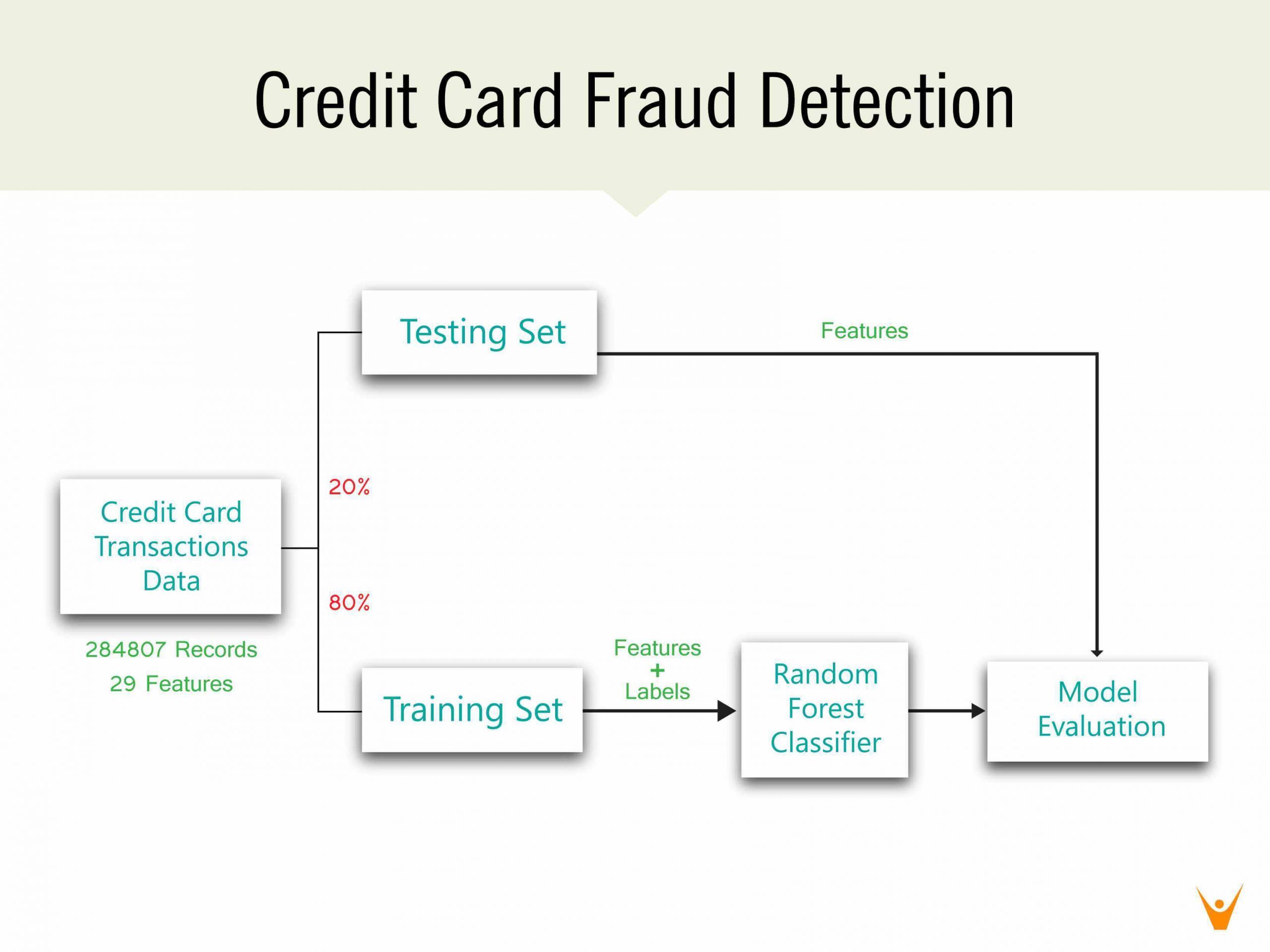
After implementing easy projects, you can now move to some advanced Data Science project ideas to learn more concepts. One such idea is Credit card Fraud Detection. With this project, you will learn how to use the R with different algorithms such as Decision Tree, Artificial Neural Networks , Logistic Regression, and the Gradient Boosting Classifier.
You can also learn to use the ‘Card Transactions’ datasets to classify the credit card transaction as a fraudulent activity or a genuine transaction. You will also learn to fit all the different types of models along with the plot performance curve for all of them. This is one of the best data science project ideas one can find.
Source Code: Credit Card Fraud Detection Project
3.2 Customer Segmentations
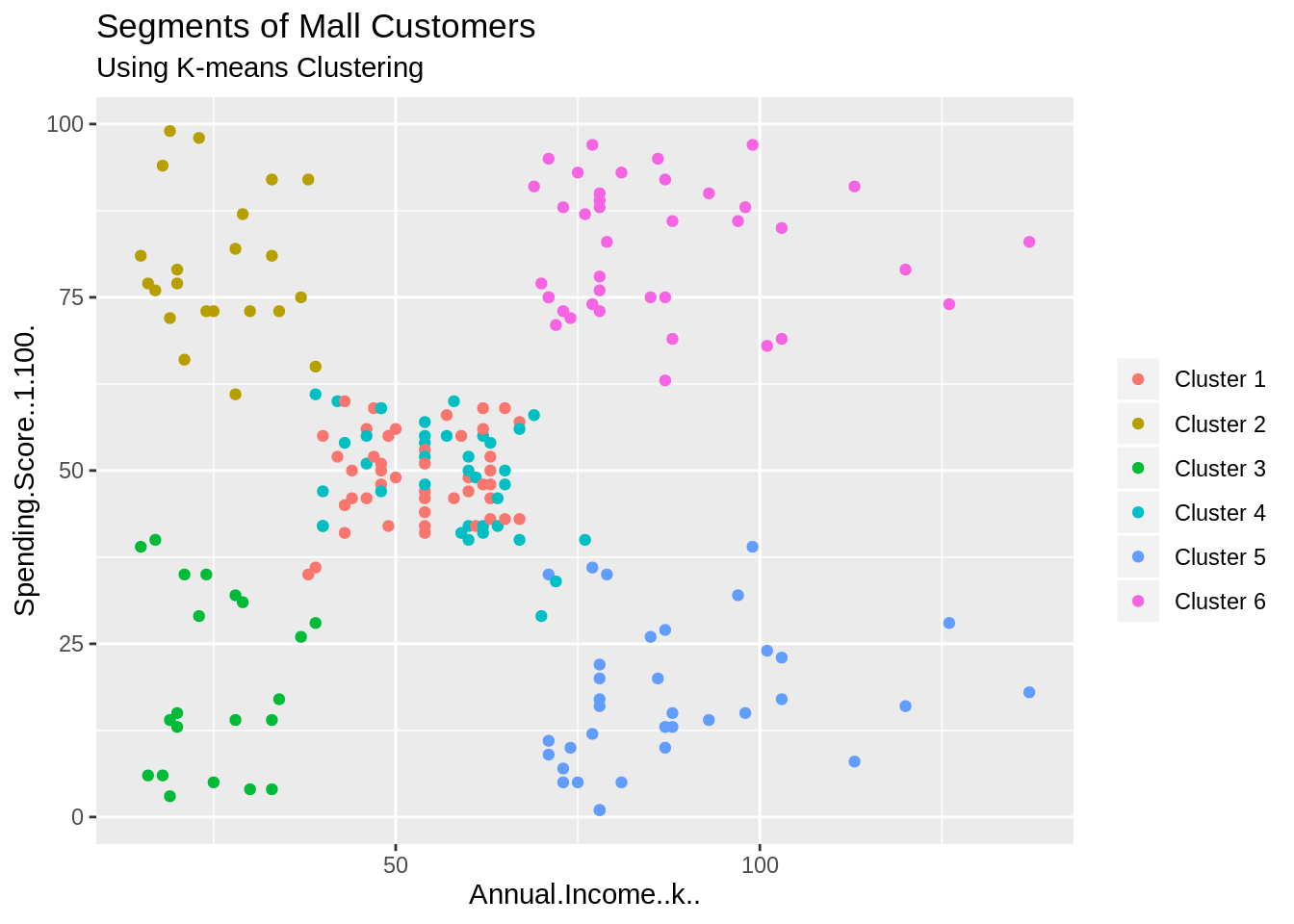
This is one of the most popular Data Science projects in the field of Data Science. Digital Marketing is an up & advanced way to target an audience for the companies through their online marketing activities for marketing purposes nowadays. So before running a marketing campaign, different customer segmentation is first done.
Customer Segmentation is among very popular applications of indeed unsupervised learning. Hereby, using clustering methods, companies can now easily identify the customers’ various segments for targeting the potential user-base. There are divisions made on customers & groups are formed according to the common characteristics such as gender, interest areas, age, and habits.
Based on these details they can effectively market each customer group. The project uses the ‘K-means clustering’ and you will learn how to perform visualizations on distributions such as gender and age. Customers annual incomes & average score values can also be analysed.
Source Code: Customer Segmentations
3.3 Traffic Signs Recognition
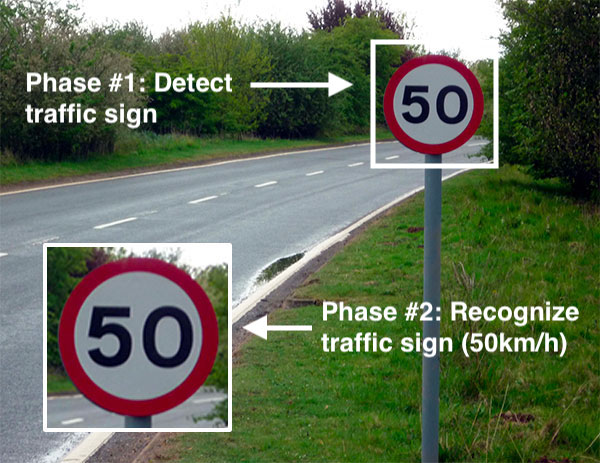
Source
This project aims to develop a model to achieve high accuracy in self-driving car technologies using CNN techniques. Traffic signs and traffic rules are of utmost importance for every driver and it must be followed to avoid accidents. To follow these rules, the user must understand how the traffic signals appear to be.
It’s a general rule that to obtain a driving license, an individual has to learn all the driving signals. But for autonomous vehicles, there are programs developed such as the ‘Traffic signs recognition’ using CNN, where you can learn how to program a model that can precisely identify various kinds of traffic signals by the input of an image.
There is a dataset called the ‘German Traffic signs recognition benchmark’. It is commonly known as the GTSRB that is used in the development of a Deep Neural Network for recognizing the class of all the traffic signs belonging to which class type. You will also learn practical knowledge of building a GUI for application interaction.
Source Code: Traffic Signs Recognition
Know more: 10 Exciting Python GUI Projects & Topics For Beginners
To find a data science project, consider identifying a problem or question that interests you, locate relevant datasets, and leverage various tools and techniques to analyze the data and derive insights. Online platforms like Kaggle, data repositories, or collaborating with organizations can offer opportunities to work on real-world projects.
Top Data Analytics Projects
Now that you have learned some of the best data science project topics, let’s take a look at some of the top data analytics projects ideas and data science topics that are currently trending in the market. Data analytics projects span a wide range of industries and applications, each with its unique challenges and insights. Here are some top data science projects for beginners that showcase the diversity and impact of data analysis:
- Customer Segmentation for E-commerce: Analyze customer behavior and purchasing patterns to segment customers based on preferences, demographics, and buying habits. This segmentation can help tailor marketing strategies, improve product recommendations, and enhance customer experiences.
- Predictive Maintenance in Manufacturing: Utilize sensor data from machinery to predict maintenance needs and prevent unplanned downtime. This can optimize maintenance schedules, reduce costs, and enhance production efficiency.
- Healthcare Fraud Detection: Analyze medical claims data to identify patterns indicative of fraudulent activities. Building predictive models can help healthcare providers and insurers detect fraudulent claims and mitigate financial losses.
- Energy Consumption Optimization: Analyze energy usage patterns in buildings to identify opportunities for energy efficiency improvements. This can lead to reduced energy costs and a smaller carbon footprint.
- Financial Portfolio Optimization: Analyze historical financial data to optimize investment portfolios. Applying techniques like Modern Portfolio Theory can help investors balance risk and return.
- Traffic Pattern Analysis: Analyze traffic data to understand congestion patterns, optimize traffic flow, and improve urban planning for transportation infrastructure.
- Predicting Disease Outbreaks: Analyze health data and historical disease outbreaks to build predictive models that can forecast and mitigate the spread of diseases.
- Real Estate Market Analysis: Analyze real estate data to identify trends, forecast property values, and assist buyers, sellers, and investors in making informed decisions.
1. Web Scraping
Knowing how to scrape data not only adds that boost to your portfolio, but also with the help of this, you can actually explore and use data sets that match with your interests, without the need for compiling the same. Various tools like Beautiful Soup or Scrapy are actually available with the help of which you can crawl the web for interesting data.
Source Code: Web Scraping
2. Data Cleaning
One of the most important tasks for every data analyst is cleaning data to make it ready to analyze. Data cleaning, also called data scrubbing is basically ensuring that the data is consistent, by removing any duplicate or incorrect data and managing the holes in the data. This is one of the best data science topics that is boun dto add value to your candidature.
Source Code: Data Cleaning
3. Exploratory Data Analysis
To put it simply, data analysis is all about answering questions with data. With the help of EDA, you can explore different questions that you want to ask.
Source Code: Exploratory Data Analysis
4. Sentiment Analysis
Last but not least is sentiment analysis, which is basically a technique in natural language processing that determines whether the data is neutral, positive, or negative. They are especially useful for public review sites and social media platforms. Furthermore, with the help of sentiment analysis, you can also detect a particular emotion based on the list of words, and their corresponding emotions. This is known as a lexicon.
Source Code: Sentiment Analysis
An Expression on Data Science Project Ideas
Data Science is continuously thriving as a great career option for this generation. It is among the most promising & happening choices altogether. The market is boosting up with more demands for Data Scientists. It has been reported recently that the demand will increase further to many folds in the coming years. So, if you are a data science beginner, the best thing you can do is work on some real-time data science project ideas.
You can also check out our free courses offered by upGrad under Data Science.
So, if you are an aspiring Data Scientist, it is highly recommended to practice skills to become an efficient professional for this field. After grabbing some very good theoretical knowledge on Data Science, if you are really looking ahead to explore what it seems like to be a professional, then now is the time to do some practical projects.
You must do some of the technical & real-time Data Science projects so that it helps you boost your career growth. The more you practice with Data Science projects , we assure you that you can keep up the pace towards becoming a sound Data Scientist professional.
Check out our Python Bootcamp created for working professionals.
Therefore, if you do some live Data Science Projects , it will enhance your knowledge, technical skills, and overall confidence. But most importantly, if you showcase even a few Data Science projects in your resume, then getting a good job is much easier for you. Why so? Because then the interviewer will know that you are really serious about a Data Science career.
Your real-time experience on Live Data Science Projects will let you hold a strong grip on Data Science trends & technologies. So, layout your hands on real-time Data Science projects & you will know how beneficial it will be for your speedy career growth. After all these discussions, we know that finding that perfect Data Science Project idea for your Data Science project concerns you even more than its actual implementation.
Our learners also read : Python online course free !
In this Data Science blog, we have listed out the names of a few Data Science Project ideas . And to answer your question – ‘What kind of Data Science project is good to start with?’, we have compiled a few good Data Science Project ideas for you to choose from.
The article also includes some of the best data science projects for beginners, that you can check out.
No Coding Experience Required. 360° Career support. PG Diploma in Machine Learning & AI from IIIT-B and upGrad. "}" data-sheets-userformat="{"2":4540,"5":{"1":[{"1":2,"2":0,"5":{"1":2,"2":0}},{"1":0,"2":0,"3":3},{"1":1,"2":0,"4":1}]},"6":{"1":[{"1":2,"2":0,"5":{"1":2,"2":0}},{"1":0,"2":0,"3":3},{"1":1,"2":0,"4":1}]},"7":{"1":[{"1":2,"2":0,"5":{"1":2,"2":0}},{"1":0,"2":0,"3":3},{"1":1,"2":0,"4":1}]},"8":{"1":[{"1":2,"2":0,"5":{"1":2,"2":0}},{"1":0,"2":0,"3":3},{"1":1,"2":0,"4":1}]},"10":2,"11":0,"15":"Arial"}"> No Coding Experience Required. 360° Career support. PG Diploma in Machine Learning & AI from IIIT-B and upGrad.
Data Science is a versatile discipline with a mix of various data science research topics and projects on data science like, statistics, mathematics, computer science, etc, to unearth meaningful insights from data. However, the process involves gathering, refining, scrutinizing, and interpreting extensive datasets to unveil patterns, trends, and correlations, facilitating informed data-driven decisions.
Data Scientists employ an array of tools and techniques, including machine learning, data visualization, and predictive modeling, to extract valuable insights that propel business growth. By amalgamating diverse skills, data science projects or data science topics for project forms an important bridge between raw data and actionable insights, fostering a deeper understanding of complex datasets and empowering organizations to make strategic decisions based on empirical evidence.
What is the Future Demand for Data Science?
Sustained growth in industries.
The future demand for data science projects or data science project ideas remains robust as industries across the spectrum increasingly rely on data-driven decision-making. From healthcare and finance to technology, the pervasive influence of data science project ideas 2023 is expected to grow, creating a sustained demand for skilled professionals.
Evolving Technological Landscape
As technology continues to advance, so does the demand for data science expertise or data science project ideas 2023. The artificial intelligence, machine learning, and big data technologies present new opportunities for data scientists while doing data science projects for final year to harness and interpret wide amounts of data, providing valuable insights that drive innovation and competitiveness.
Integration with AI and Automation
The integration of Data Science along with artificial intelligence (AI) and automation further fuels demand. Organizations are seeking data scientists after doing data science projects for final year to develop algorithms, machine learning models, and automation solutions that optimize processes, enhance efficiency, and contribute to strategic decision-making.
Emerging Fields and Specializations
Data science projects or data science research topics is branching into specialized fields such as data engineering, natural language processing, and computer vision. As these domains gain prominence, the demand for topics for data analysis project or data science projects for beginners and professionals with niche expertise is expected to rise. The diversification of roles within the broader field of data science projects or data science project ideas contributes to a nuanced demand landscape.
Enhanced Business Intelligence
In an era where data is often hailed as the new currency, businesses are increasingly recognizing the pivotal role of Data Science in gaining a competitive edge. The ability to transform raw data into actionable insights enhances business intelligence, enabling companies to make informed decisions, understand customer behavior, and adapt to market trends swiftly.
Global Adoption and Data Privacy
As data science projects or data science topics for project becomes a global phenomenon, challenges related to data privacy and security emerge. The demand for professionals and topics for data analysis project well-versed in ethical data practices and regulatory compliance is on the rise. Data scientists who can navigate these challenges in the form of data engineer projects while extracting valuable insights will be in high demand, ensuring the responsible and effective use of data.
Why is Data Science a Very Attractive Career Opportunity?
Embarking on a career as a data scientist and looking for project ideas for data analytics or data engineer projects isn’t just visually appealing from the outside; it also offers an engaging and rewarding journey within. Let’s delve into the various perks that make this career path stand out while getting into project ideas for data analytics.
One of the foremost perks that data scientists revel in is the freedom to choose their data science projects for beginners and technologies. Unlike being confined to a specific industry, data scientists can navigate diverse realms, especially those brimming with enormous potential. This liberty fosters a dynamic work environment, keeping the profession consistently invigorating.
Working with Reputed Organizations
The marriage of data science projects with artificial intelligence and machine learning opens doors to collaborations with industry behemoths such as Uber, Apple, and Amazon. The sheer volume of data, or “big data,” stored by these global corporations ensures an enriching experience for data scientists, contributing to the enhancement of user interactions and overall business strategies.
Rewarding Salary
The financial allure of a data science projects or python data science projects is undeniable. With a median salary exceeding $120,000, data scientists are handsomely rewarded for the value they bring to organizations. This substantial remuneration cements data science as one of the most attractive and best career options.
In-Demand Skills
In a tech-driven era, the demand for data scientists is soaring, with a growth rate surpassing 100% annually. As predicted by IBM in 2018, this trend continues unabated. The skill set of data scientists remains in high demand, aligning with the ever-evolving technological landscape.
Stable Career Option
Unlike transient sectors in the corporate landscape, data science stands out as a stable career option. While industries may rise and fall, the relevance and growth trajectory of data science remains steadfast. With the integration of artificial intelligence as a driving force, big data, and consequently, data science, are poised for sustained significance.
Entrepreneurial Opportunities
A unique advantage for seasoned data scientists lies in the potential to venture into entrepreneurship. This means candidates full of comprehensive industry knowledge data scientists can seamlessly transition into business ownership. This entrepreneurial journey could manifest in ventures within the data science and big data domain or even branch into specific industries they’ve previously engaged with, such as e-commerce or video streaming platforms.
Skills Needed to Become a Data Science Professional
Technical proficiency.
At the core of a data science professional’s skill set lies technical proficiency. This includes mastery of programming languages like Python or R, as well as a strong command of statistical analysis and data manipulation. A solid foundation in these technical aspects empowers professionals to effectively navigate and manipulate datasets.
Data Visualization
The ability to translate complex data into visually understandable insights is a crucial skill. Data visualization tools like Tableau or Matplotlib help professionals while doing data analysis project ideas for students create compelling visuals that convey patterns and trends. This skill not only aids in the interpretation of data but also enhances communication with stakeholders by presenting findings in a clear and impactful manner.
Machine Learning Expertise
Proficiency in ML algorithms and techniques is imperative for a data science professional. Understanding supervised and unsupervised learning, regression, and classification algorithms equips individuals to apply predictive analytics, extract meaningful patterns, and make informed decisions based on data-driven models.
Domain Knowledge
Beyond technical understanding, a data scientist benefits greatly from domain knowledge. Understanding the industry or field in which they operate allows professionals to contextualize data findings. This bridge between data and industry insights enhances the relevance and impact of their analyses, facilitating more informed decision-making.
Problem-Solving Skills
Data science is inherently about solving problems, and strong problem-solving skills are a cornerstone of success. Professionals need to approach data challenges with a logical mindset, breaking down complex issues into manageable components. This skill ensures effective troubleshooting and the development of innovative solutions.
Continuous Learning
In the ever-evolving landscape of data science, a commitment to continuous learning is essential. Professionals should stay abreast of emerging technologies, tools, and methodologies. This proactive approach not only keeps their skills relevant but also positions them to leverage the latest advancements, contributing to their effectiveness as data science practitioners.
To conclude, becoming a proficient data science professional requires a combination of technical mastery, data visualization skills, machine learning expertise, industry-specific knowledge, problem-solving capabilities, and a commitment to continuous learning. This comprehensive skill set equips professionals to navigate the complexities of data analysis and contribute meaningfully to decision-making processes in a rapidly advancing field.
Why Should You Learn Data Science?
Before going further into the different data science project ideas that are available, let’s take a look at some of the reasons why data science projects are considered to be so important in today’s world.
1. Data is the new driving force behind industries
Needless to say, in today’s technology-driven world, large enterprises across different industries rely heavily on data for everything, starting with their business growth to expansion. Thus, it wouldn’t be too wrong to say that data is the electricity that powers all the industries of today.
Industries make use of data to improve their performance, generate revenue, and provide better customer service. Infact, the automobile industry, too, is harnessing the power of data to improve the safety of their vehicles. Their goal is to create powerful machines that think in the form of data.
2. Demand And Supply
Although there is a huge abundance of data, there are not enough resources available that can convert this data into powerful products. This basically means that there is still a huge dent in the data scientists, because of a lack of data literacy in the market.
3. High Paying Job Opportunities
Currently, data science is considered a highly lucrative career. Infact, according to some researchers, a data scientist makes 63% more than the national average salary. Apart from this, data scientists also get to enjoy a position of prestige in the company. This is because companies rely heavily on data scientists to make data-driven decisions and guide the organization in the right direction.
4. Data Science is the next big thing
As more and more industries are becoming data-driven, there is a constant need for data scientists. The field of technology is becoming more dynamic and new innovations are being made every day. Thus, data science is the career of the future.
Here are 50 Data Science Project ideas for you, and in the blog ahead, we are discussing a few of these projects in detail. So let’s begin!
- Analyzing the impact of climate change on global food supply
- Weather Prediction
- Keyword generation for google ads
- Wine Quality Analysis
- Stock Market Prediction
- Video Classification
- Medical Report Generation using CT Scans
- Email Classification
- Uber Data Analysis
- Sound Classification
- Credit Card Fraud Detection
- Sign Language Recognition
- Class of Flower Prediction
- Colour Detection
- Loan Prediction
- Road Traffic Prediction
- Income Classification
- Speech Emotion Recognition
- Celebrity Voice Prediction
- Store Sales Prediction
- Detecting Parkinson’s Disease
- Air Pollution Prediction
- Age and Gender Detection
- Optimizing Product Price
- IMDB Predictions
- Handwritten Digit Recognition
- Quora Insincere Questions Classification
- Driver Drowsiness Detection
- Web Traffic Time Series Forecasting
- Survival Prediction on the Titanic
- Time Series Modelling
- Image Caption Generator
- Insurance Purchase Prediction
- Crime Analysis
- Customer Segmentation
- Taxi Trip Time Prediction
- Job Recommendation System
- Boston Housing Predictions
- Interest Level in Rental Properties
- Keyword generation for Google Ads
- Breast Cancer Classification
- Employee Computer Access Needs
- Tweets Classification
- Movie Recommendation System
- Product Price Suggestions
Also, check out our business analytics course to widen your horizon.
Data analytics projects for final-year students
Here are some data science project ideas for final year students:
- Predictive Modeling for Student Performance: Analyze historical academic data to predict student performance based on various factors like attendance, study habits, socioeconomic background, etc.
- Customer Segmentation for E-commerce: Cluster customers based on their purchasing behavior and demographics to provide targeted marketing strategies.
- Movie Recommendation System: Build a recommendation system that suggests movies to users based on their viewing history and preferences.
- Healthcare Analytics: Analyze patient records to identify trends, predict disease outbreaks, or assess the impact of different treatments.
- Social Media Sentiment Analysis: Analyze sentiment on social media platforms regarding a specific topic, brand, or event.
- Predicting Stock Prices: Use historical stock data to build a model that predicts future stock prices.
- Energy Consumption Analysis: Analyze energy consumption patterns in a specific region and suggest strategies for more efficient energy use.
- Crime Pattern Analysis: Analyze crime data to identify patterns and trends in criminal activities for better resource allocation in law enforcement.
- Sports Analytics: Analyze player performance, team strategies, and historical game data to gain insights into sports dynamics.
- Real Estate Market Analysis: Analyze housing market data to predict property values, identify investment opportunities, or understand market trends.
Read our popular Data Science Articles
Bottom line.
In this article, we have covered top data science project ideas. We started with some beginner projects which you can solve with ease. Once you finish with these simple data science projects, I suggest you go back, learn a few more concepts and then try the intermediate projects.
When you feel confident, you can then tackle the advanced projects. If you wish to improve your data science skills, you need to get your hands on these data science project ideas. Now go ahead and put to test all the knowledge that you’ve gathered through our data science project ideas guide to build your very own data science project!
We wish that you will drastically improve all the skills of Data Science with the project ideas we presented to you here in this blog. But in case you are new to the Data Science field & would love to learn the Data Science & build similar models for the technological advancements, we recommend you to check out the online course on upGrad & IIIT-B’s PG Diploma programs to learn & upskill in the Data Science world with experienced & expert professionals.
With the right set of knowledge, guidance & tools, you can learn any Data Science project. No level is difficult for learners. That’s why all these live projects are a perfect way to enhance one’s skills and fast progress in attaining mastery. At upGrad , we offer 3 Data Science Online Certification:
1. Executive PG Programme in Data Science (12 months)
From IIIT Bangalore
2. Master of Science in Data Science (18 months)
From Liverpool John Moores University
3. Advanced Certificate Programme in Data Science (7 months)
Try these Data science online certifications by upGrad as we are sure that they will help you in your Data Science career path. Therefore, don’t delay! Start your practice now!
Rohit Sharma
Something went wrong
Our Trending Data Science Courses
- Data Science for Managers from IIM Kozhikode - Duration 8 Months
- Executive PG Program in Data Science from IIIT-B - Duration 12 Months
- Master of Science in Data Science from LJMU - Duration 18 Months
- Executive Post Graduate Program in Data Science and Machine LEarning - Duration 12 Months
- Master of Science in Data Science from University of Arizona - Duration 24 Months
Our Popular Data Science Course

Data Science Skills to Master
- Data Analysis Courses
- Inferential Statistics Courses
- Hypothesis Testing Courses
- Logistic Regression Courses
- Linear Regression Courses
- Linear Algebra for Analysis Courses
Frequently Asked Questions (FAQs)
The following points should be kept in mind before starting any Data Science project: Choose the programming language that you are comfortable with. However, the language chosen should be one of the in-demand languages such as Python, R, and Scala. Use datasets from trusted sources. You can use Kaggle datasets. Moreover, make sure that the dataset you are using does not contain errors. Find errors or outliers in your dataset and rectify them before training your model. You can use visualization tools to find the errors in your dataset.
The following components highlight the most general architecture of a Data Science project: Problem Statement : This is the fundamental component on which the whole project is based. It defines the problem that your model is going to solve and discusses the approach that your project will follow. Dataset : This is a very crucial component for your project and should be chosen carefully. Only large enough datasets from trusted sources should be used for the project. Algorithm : This includes the algorithm you are using to analyze your data and predict the results. Popular algorithmic techniques include Regression Algorithms, Regression Trees, Naive Bayes Algorithm, and Vector Quantization. Training Models : This involves training your model against various inputs and predicting the output. This component decides the accuracy of your project. Using proper training techniques can produce better outcomes.
The following are the essential skills and tools any Data Science enthusiast should master: 1. Statistical Skills including Probability 2. Analytical Skills to analyze and test the data. 3. Programming languages such as Python, R, Scala, and JAVA. 4.Data Visualization Tools such as Power BI, Tableau 5. Algorithms including Regression, Decision Trees, Bayes Algorithm 6. Calculus and Algebra. 7. Communication and Presentation Skills 8. Databases such as SQL 9. Cloud Computing to manage the resources Apart from these technical skills, a professional Data Scientist should also have some soft skills to provide value to the company and improve interpersonal relationships. These skills include critical and curious thinking, business orientation, smart communication skills, problem-solving, team management, and creativity.
Related Programs View All

View Program

Executive PG Program
Complimentary Python Bootcamp

Master's Degree
Live Case Studies and Projects

8+ Case Studies & Assignments

Certification
Live Sessions by Industry Experts
ChatGPT Powered Interview Prep

Top US University

120+ years Rich Legacy
Based in the Silicon Valley
Case based pedagogy
High Impact Online Learning

Mentorship & Career Assistance
AACSB accredited
Placement Assistance
Earn upto 8LPA
Interview Opportunity
8-8.5 Months
Exclusive Job Portal

Learn Generative AI Developement
Explore Free Courses
Learn more about the education system, top universities, entrance tests, course information, and employment opportunities in Canada through this course.
Advance your career in the field of marketing with Industry relevant free courses
Build your foundation in one of the hottest industry of the 21st century
Master industry-relevant skills that are required to become a leader and drive organizational success
Build essential technical skills to move forward in your career in these evolving times
Get insights from industry leaders and career counselors and learn how to stay ahead in your career
Kickstart your career in law by building a solid foundation with these relevant free courses.
Stay ahead of the curve and upskill yourself on Generative AI and ChatGPT
Build your confidence by learning essential soft skills to help you become an Industry ready professional.
Learn more about the education system, top universities, entrance tests, course information, and employment opportunities in USA through this course.
Suggested Blogs

by Rohit Sharma
28 May 2024

21 May 2024

by Shaheen Dubash
20 May 2024
![data science dissertation topics Python Free Online Course with Certification [2024]](https://www.upgrad.com/__khugblog-next/image/?url=https%3A%2F%2Fd14b9ctw0m6fid.cloudfront.net%2Fugblog%2Fwp-content%2Fuploads%2F2019%2F07%2FBlog_FI_July_upGrads-Career-advice.png&w=3840&q=75)
19 May 2024

16 May 2024

IMAGES
VIDEO
COMMENTS
If you're just starting out exploring data science-related topics for your dissertation, thesis or research project, you've come to the right place. In this post, we'll help kickstart your research by providing a hearty list of data science and analytics-related research ideas, including examples from recent studies.. PS - This is just the start…
22.) Cybersecurity. Cybersecurity is a relatively new research topic in data science and in general, but it's already garnering a lot of attention from businesses and organizations. After all, with the increasing number of cyber attacks in recent years, it's clear that we need to find better ways to protect our data.
The best course of action to amplify the robustness of a resume is to participate or take up different data science projects. In this article, we have listed 10 such research and thesis topic ideas to take up as data science projects in 2022. Handling practical video analytics in a distributed cloud: With increased dependency on the internet ...
Abstract. To drive progress in the field of data science, we propose 10 challenge areas for the research community to pursue. Since data science is broad, with methods drawing from computer science, statistics, and other disciplines, and with applications appearing in all sectors, these challenge areas speak to the breadth of issues spanning science, technology, and society.
Unlocking the Realm of Data Science Dissertation Topics. In the ever-evolving landscape of technology, data science stands as a cornerstone, reshaping industries and revolutionizing approaches to problem-solving. As the demand for data-driven insights continues to soar, the pursuit of knowledge in this field becomes increasingly crucial. ...
A data science research paper should start with a clear goal, stating what the study aims to investigate or achieve. This objective guides the entire paper, helping readers understand the purpose and direction of the research. 2. Detailed Methodology. Explaining how the research was conducted is crucial.
1. Introduction. Statistics and data science are more popular than ever in this era of data explosion and technological advances. Decades ago, John Tukey (Brillinger, 2014) said, "The best thing about being a statistician is that you get to play in everyone's backyard."More recently, Xiao-Li Meng (2009) said, "We no longer simply enjoy the privilege of playing in or cleaning up everyone ...
2015. 2014. 2013. 2012. 2011. 2010. 2009. 2008. This list of recent dissertation topics shows the range of research areas that our students are working on.
They will stress the importance of structure, substance and style. They will urge you to write down your methodology and results first, then progress to the literature review, introduction and conclusions and to write the summary or abstract last. To write clearly and directly with the reader's expectations always in mind.
For ease of students, we offer a list of trending data science dissertation topics. Review Our Quality Computer Science Dissertation Examples Premier Dissertations has produced a list of the latest dissertation topics in data science for 2024. If you would like to choose any topic from the list below, simply drop us a WhatsApp or an Email.
The handout provides a curated list of 20 data science dissertation topics for students in 2023. It emphasizes the importance of selecting a research area aligned with personal interests and addressing current trends and challenges in the field. The topics cover machine learning, data mining, artificial intelligence, and big data analytics.
Data Science means using scientific methods to analyze and extract meaningful data from a huge amount of data. Some of the most important data science topics are Data Mining, Data Manipulation, Statistics, Data Engineering, etc. What makes this field so valuable is that it contributes a lot in other fields like it is used for calculating market ...
Data science thesis topics. We have compiled a list of data science research topics for students studying data science that can be utilized in data science projects in 2022. our team of professional data experts have brought together master or MBA thesis topics in data science that cater to core areas driving the field of data science and big data that will relieve all your research anxieties ...
The Ph.D. in Data Science and Analytics is an advanced degree with a dual focus of application and research - where students will engage in real world business problems, which will inform and guide their research interests. We launched the first formal PhD program in Data Science in 2015.
The task in this thesis is to give a detailed overview of physics-informed neural network architec-tures, and to compare several on a standard data set from fluid dynamics. A particular focus will be set on the task to reconstruct complex physical data from a small number of realistically measurable data points. Literature
Here are the hand-picked dissertation topics for data science that can help you grab the reader's attention quickly and without too much effort. 1. Compare the implementation of data science in various investigations concerning wildfires. 2. Explain the K-means clustering from the perspective of online spherical.
Nevertheless, some students have difficulties choosing big data topics for their computer science thesis or research paper. That's because finding information to write about some topics is not easy. To solve this problem, we list the top 100 topics in data science that learners can choose from. Trendy Big Data Research Topics
Statistical Learning and Data Science Chair :: Theses. Theses. The chair typically offers various thesis topics each semester in the areas computational statistics, machine learning, data mining, optimization and statistical software. You are welcome to suggest your own topic as well. Before you apply for a thesis topic make sure that you fit ...
There are so many methods and techniques to perform dimension reduction. The most popular of them are Missing Values, Low Variance, Decision Trees, Random Forest, High Correlation, Factor Analysis, Principal Component Analysis, Backward Feature Elimination. 4. Classification.
Looking for MSc Data Science Thesis Ideas. Hi everyone, long time lurker here. I'm hoping the community can provide some inspiration for a thesis topic I can explore. I have a background in computer science and applied math. I worked for 2 years as a data scientist and I'm quite comfortable with the following technologies; keras, sklearn ...
Below are the steps you can follow for choosing a topic for a data science project as a student. First Choose a Domain. To choose a topic for a data science project, you need to know what field you would like to work in as a data science professional. First, choose the area you know the best. For example, marketing, finance, healthcare, social ...
Faisal Hussain. Al-Khawarizmi Institute of Computer Science (KICS) Lahore Pakistan. Taki Uddin, with respect to your expertise in IoT and interest in data science, I would suggest you to work on ...
2.1 Recognition of Speech Emotion. Source. One of the popular Data Science project ideas is recognition of the speech emotion. If you want to learn the usage of different libraries, this project is perfect for you. You must have seen a lot of editor tools that can tell us how our speech emotion is appearing.
Learn Data Science or improve your skills online today. Choose from a wide range of Data Science courses offered from top universities and industry leaders. Our Data Science courses are perfect for individuals or for corporate Data Science training to upskill your workforce.